The Best of 2023
With 2023 now in the books, it’s time to look back on the year in movies. In this first of three blogs, I spotlight my Top 10 Films of 2023, followed by 10 Honorable Mentions and an open-ended list (in alphabetical order) of other releases that I found noteworthy. In each case, I’ve included web site and trailer links, as well as links to my own reviews, either those that have been published as full blogs or as summary write-ups in this site’s Quick Cuts section.
In addition, due to the special circumstances caused by the writers’ and actors’ strikes, as well as the carryover effect from the COVID pandemic – both of which caused some havoc with distribution schedules – I have included a new category this year: a list of my favorite films that were produced in previous years but whose release was impacted by these delays and weren’t released until 2023. This is also an open-ended list with pictures listed in alphabetical order and no particular ranking.
In separate blog posts, I examine my Worst Films of 2023, as well as a review of my picks for the Best and Worst in 2023 Documentaries.
So, with that said, check out what I thought about 2023’s crop of movies. You may not agree with me, and I respect your opinions, regardless of whether our views align. I hope you’ll respectfully grant me the same. And your feedback, as always, is welcome. Here goes!
The Top 10 Countdown
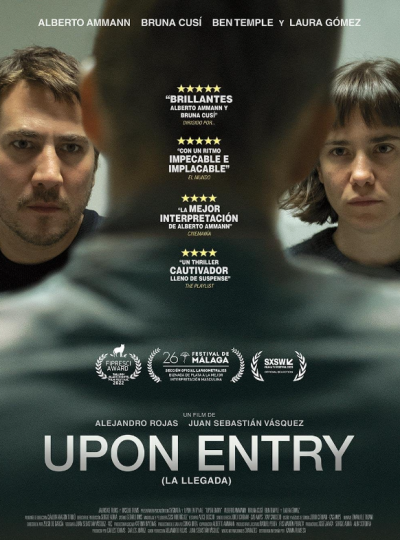
10. “Upon Entry” (“La Ilegada”) (Spain)
Welcome to America, land of the free and home of the brave, a sanctuary for the world’s poor, tired and huddled masses. Or is it? That’s the question raised in this gripping, edgy debut feature from the writing-directing duo of Alejandro Rojas and Juan Sebastián Vasquez. When a Spanish couple (Alberto Ammann, Bruna Cusí) relocating to the US on legally obtained visas launches the process of beginning a new life, they’re unexpectedly detained by authorities on arrival at the New York port of entry, where they’re subjected to intense questioning about matters of an undisclosed nature. With no explanation for the interrogation, they’re asked an increasingly intrusive line of questioning by two antagonistic agents (Ben Temple, Laura Gómez) who offer no rationale for their hostile scrutiny. It’s an exercise on par with an increasingly brutal fraternity hazing ritual, one aimed at ultimately trying to uncover some kind of secretive, allegedly illegal scheme driven by trumped-up speculation and the couple’s growing resistance to cooperate, especially when they seem to be guilty at best of failing to dot a few i’s and cross a few t’s. They become reluctant to answer highly personal questions, leading to circumstances that eventually threaten to tear apart the fabric of the duo’s obviously loving relationship. While it’s certainly reasonable to employ prudent security precautions in immigration and customs scenarios, is this kind of unduly malicious treatment really necessary, particularly when the couple ostensibly appears to be playing by all the rules? Is this the America we want, one driven by paranoia and pervasive suspicion? And, if so, then why would anyone want to come here in the first place, even when making a diligently concerted effort to follow all of the legally sanctioned protocols? This film sends a powerful message about these kinds of practices, especially given that some of them have actually been in place far longer than most American citizens are aware of. These issues are disturbingly brought to life by the film’s meticulously crafted writing, which keeps characters and viewers alike guessing about what’s playing out, combined by the superb performances of the four principals, who effectively convey the anguish and fright being wrought on screen. This Tubi TV offering is highly deserving of its three Independent Spirit Award nominations for best first feature, best first screenplay and best editing, even if it’s also the kind of picture that makes audiences uneasy – but, then, maybe that’s the point behind it, too, a goal at which it succeeds brilliantly.
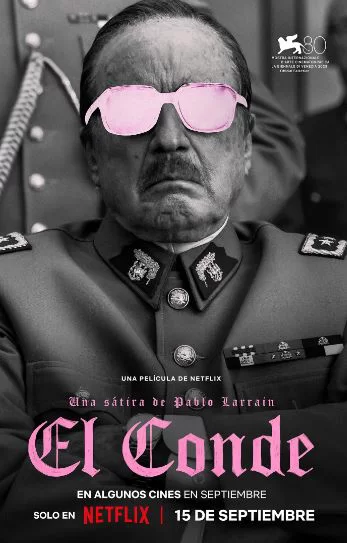
9. “El Conde” (“The Count”) (Chile)
Fusing cinematic genres can be tricky, especially if the mix doesn’t mesh. But the latest from writer-director Pablo Larraín successfully pulls off a brilliantly original blend and does so just about perfectly. This metaphorical account of the life of former Chilean dictator Augusto Pinochet (1915-2006) (Jaime Vadell) portrays the onetime-strongman as a vampire a la Dracula (hence the title and the character’s nickname, “the Count”), shot in the style of F.W. Murnau’s black-and-white silent film classic, “Nosferatu” (1922). The story charts the immortal’s life from his birth as orphaned royalist Claude Pinoche in late 18th Century France through the many military campaigns in which he fought to put down radical rebellions before finally rising to power as the right-wing dictator of Chile through the 1973 coup d’état of left-wing President Salvador Allende. But much of the narrative actually follows Pinochet in the years after he was himself out of office, living a life in seclusion after faking his death. It’s a time when he is being stalked by various parties seeking to get their hands on his illegally amassed fortune, including his wife (Gloria Münchmeyer), his longtime butler (Alfredo Castro), a nun/exorcist posing as an accountant auditing his assets (Paula Luchsinger) and his five adult children. And, ironically, as all of this is transpiring, Pinochet himself is in the throes of ennui, trying to make up his mind about whether or not he wants to go on living. Many story threads emerge and become intertwined, satirically invoking wry observations about despotism, greed, power, lust, immortality and religion. On top of all this, there’s an articulate, faceless narrator with a pronounced British accent who tells the tale and makes an unexpected on-screen appearance late in the film, taking things in an entirely new direction with deliciously twisted plot developments. Add to all this the film’s stunningly gorgeous Oscar-nominated monochrome cinematography, superb production design, fine performances and positively sparkling screenplay, along with just enough restrained campiness in the dialogue and special effects to make viewers giggle with delight without becoming silly, and you’ve got one finely crafted production, perfectly integrated and nicely balanced. Admittedly, the pacing drags a smidge late in the second act, but that’s easily dismissed considering how well everything else works together. Also, the film is quite graphic in a number of sequences, so squeamish and sensitive viewers would be wise to avoid this one. But, if you’re not faint of heart and have an appetite for the macabre, give this Netflix exclusive a look. Director Pablo Larraín’s pictures keep getting better and better with every outing, and this is the latest in a string of releases that have firmly established him as one of the finest auteurs in the business these days, so tune in and see for yourself.
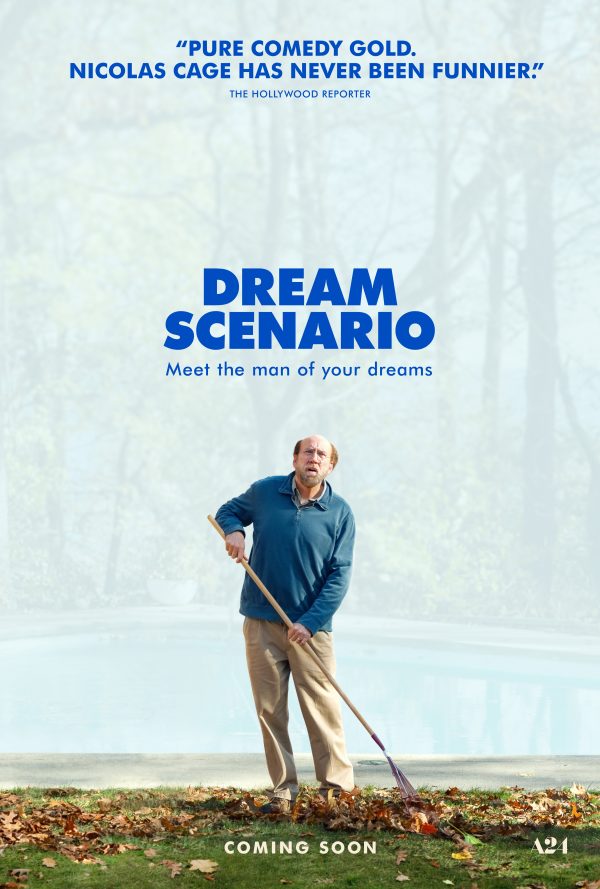
8. “Dream Scenario” (USA)
Packing a lot of material and ideas into a single film can result in a muddled, confusing mess, no matter how well-meaning a filmmaker’s intentions might be. However, in his third feature outing, writer-director Kristoffer Borgli succeeds for the most part when it comes to tackling such an imposing task. This offbeat tale of tenured but underappreciated university professor (Nicolas Cage) takes viewers on a wild ride through the diverse realms of fame, metaphysics, cancel culture, unrelenting group think, and unexpressed, underpursued desire, along with the downside consequences of each. All of this comes about when the middle-aged everyman protagonist inexplicably begins showing up in the dreams of countless people, many of whom he doesn’t even know. This curious oneiric anomaly – an inspired metaphor for one’s presence on social media and in the public eye – quickly transforms him into an overnight viral media sensation, one that starts off with a generous showering of attention and lustful admiration but that almost as quickly leads him to become a scorned, put-upon pariah. He swiftly becomes more than just yesterday’s news; he turns into the object of a targeted campaign of cancel culture, hate speech and unapologetic ostracism. And, ironically, it all stems from something he never wanted nor asked for in the first place (at least in the form it ultimately took). From the foregoing description, it might sound like the filmmaker has tried to overstuff this vehicle with far too much material for viewers to process and comprehend, and there are points in the story (especially in the last half hour) where a good case could be made for that argument. However, in telling this allegorical fable, the director manages to keep the narrative’s ideas distinctly sorted and in context to drive home his message, a powerful cautionary tale about the point we’ve collectively reached as a society with respect to these powerful and potentially damaging matters and practices. These are notions that we all need to hear but seldom do because of all the noise surrounding us that prevents us from hearing the music because of all the notes. For all this seriousness, however, “Dream Scenario” is loaded with hilarious, laugh-out-loud humor and fine performances all around (especially those of Golden Globe Award nominee Cage and Michael Cera as an empty-headed, self-absorbed brand management expert), complemented with skillful film editing and carefully selected incidental shots that effectively punctuate the mood of many scenes. The script is generally solid, too, though it begins to stray somewhat from the material that works best in the final act, and there are a few graphically violent sequences that sensitive viewers should be wary of. On balance, though, this is the kind of production that should be made in greater numbers in an age where so many of us have lost touch with reason, our existence and ourselves. Maybe watching an offering like this could help us all sit up, think and get back on track while we still can.
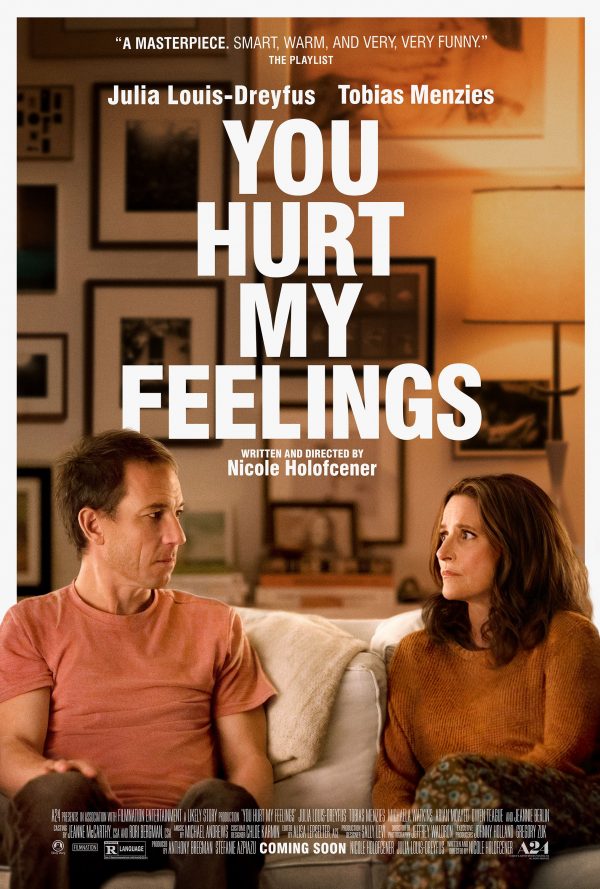
7. “You Hurt My Feelings” (USA)
One thing for sure you can say about the films of writer-director Nicole Holofcener is that they’re rarely what you expect but always deliver more than you hope for. What’s more, given her recent track record, she keeps getting better and better with each release. Building on inventive narrative styles, precise cinematic pacing, superb character development, a knack for capturing the unexpected and impeccable writing quality developed in her recent directorial works “Please Give” (2010) and “Enough Said” (2013), as well as her spot-on screenplay aptitude in “Can You Ever Forgive Me?” (2018), the filmmaker has done it again in this insightful comedy-drama, arguably her funniest and most accessible work to date. Holofcener’s multi-layered storytelling approach covers a great deal of ground, from how much honesty is too much to taking personal responsibility for resolving one’s own issues to wrestling with the ennui of nagging midlife challenges (particularly where matters of career performance are involved). The picture’s overlapping story threads integrate seamlessly, often with carefully crafted, raucously funny boomerang effects. In addition to making viewers laugh, the film also makes them think, serving up incisive scenarios that truly give audience members much to contemplate, including incidents that they might have otherwise failed to consider. This is all stunningly brought to life by the positively stellar ensemble cast, especially Julia Louis-Dreyfus in one of her best-ever lead performances. To be sure, the story meanders a bit at the outset, but the opening act is decidedly designed to set up what’s to come, all of which plays out flawlessly as the picture unfolds. “You Hurt My Feelings” may not conform to convention or deliver what viewers expect going in, but, like a well-prepared dinner, it definitely satisfies one’s appetite for a thoroughly satisfying meal. View hearty, everyone.
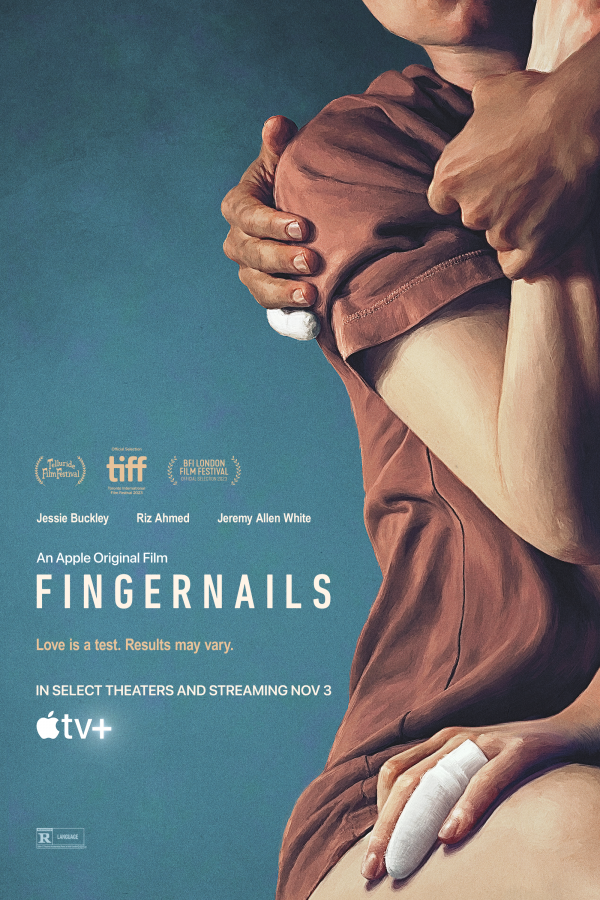
6. “Fingernails” (USA/UK)
How do we know when we’re in love? And, even if we suspect we are, how do we know if we’re with the right person? In an age where individuals are increasingly out of touch with their own feelings – especially the one they seem to crave the most – these are pressing questions that desperately beg answers. So what should we do? Maybe technology is the answer. But how reliable is it? Can we trust it to give us definitive, accurate, meaningful results? Those are the issues that writer-director Christos Nikou addresses in his second feature outing, an excellent follow-up to his superb debut, “Apples” (2020), hitting his second cinematic home run in a row. In this insightful romantic comedy/drama, the filmmaker takes viewers on a heartfelt yet delightfully quirky absurdist odyssey in a society where amorously lost souls seek verification of the validity of their partnerships through a medical test that calls for the removal of one of each of the partners’ fingernails as a means of scientifically determining compatibility (talk about an act of commitment). And, to strengthen those relationships, the organization sponsoring these tests augments the results with a series of carefully structured (though frequently hilarious, somewhat clichéd and often seemingly preposterous) lessons designed to promote enhanced intimacy. But are these exercises proof positive of a successful match? That’s a question raised by one of the organization’s new instructors (Jessie Buckley), who has nagging doubts about the long-term viability of her relationship with her supposedly verified true love (Jeremy Allen White). The ante is further upped when she meets a fellow instructor (Riz Ahmed) with whom an unspoken but decidedly sensuous mutual attraction develops. In light of that then, can old-fashioned gut feelings legitimately trump allegedly solid science, particularly at a time when technology is being trumpeted as a panacea for all our problems, including those of an emotional nature? “Fingernails” does an exceedingly thoughtful job of examining these matters while incorporating both sublime yet sidesplitting humor and offbeat theoretical concepts that give us much to think about, qualities that helped to establish and distinguish Nikou as a director in his first film. In this offering, however, he builds upon that stylistic foundation by adding themes aimed at promoting truly genuine feelings aimed at plucking the heartstrings without becoming manipulative or sappy, creating a layered, thought-provoking, richly rewarding viewing experience. This is all brought to life by the fine performances of the three protagonists and an excellent supporting cast, backed by skillfully crafted humor parodying a number of other films and a nuanced soundtrack consisting of deftly chosen selections that definitively set the mood for countless scenes. Admittedly, the generally solid pacing could have used some tweaking in a few sequences, and the ending could have been a little more developed, but these modest shortcomings detract little from the overall quality of this fine production. If you doubt that, see this one for yourself and let your own mind – and not some technical contraption or overly intellectualized abstraction – decide for you.
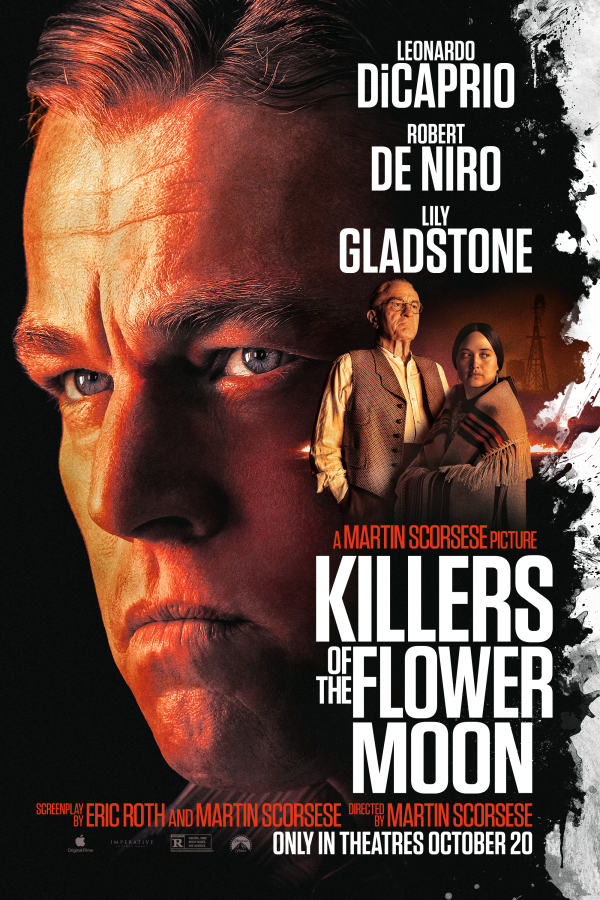
5. “Killers of the Flower Moon” (USA)
The importance of addressing (and attempting to correct) gross injustices can’t be overemphasized, and that’s the key objective behind writer-director Martin Scorsese’s latest release. This fact-based saga chronicles attempts by unscrupulous, two-faced White swindlers clandestinely (and sometimes quite brazenly) seeking to steal the considerable assets of wealthy Osage Indians in Oklahoma in the 1920s after oil is discovered on their land. This tragic tale explores the depths that these immoral criminals would go to (including murder) in the name of unabashed greed, efforts ironically spearheaded by the local, smiling, allegedly well-meaning sheriff (Oscar nominee Robert DeNiro) with the help of his dimwitted nephew (Leonardo DiCaprio), especially in their scheme to shamelessly pilfer the wealth of the accomplice’s own wife (Oscar nominee Lily Gladstone). The sweeping scope of this offering is indeed impressive, effectively brought to life by the fine performances of the three principals and an excellent ensemble of supporting players. And the stellar cast is backed by proficiently executed work in an array of technical areas, including production design, writing, cinematography and the late Robbie Robertson’s original background score, making for a gorgeous picture to look at, all of which have earned “Flower Moon” a boatload of awards season nominations, including an Oscar nomination for best picture. However, the runtime of 3:26:00 – with no intermission – is a challenge to manage, even for the most patient and tolerant moviegoer. I streamed it, watching it in two parts, almost as if it were more of a TV miniseries than a standalone film, the only way I could effectively see myself getting through it. This handling of the story, in my opinion, represents something of a significant miscalculation by the filmmaker and the film editing staff – either cut the picture (which could have been done without losing much) or add a much-needed break partway through (which could have been accomplished without inhibiting the story’s continuity). In my view, I believe that the second half was far better and more compelling than the first and that some of the narrative’s more incidental detail could have easily been dispensed with without affecting the overall quality of the release. Still, that aside, it’s obvious that this project was a labor of love for the director, one with a clear vision of what the filmmaker wanted to say in relating an important and little-known story of injustice in a nation that professes to be a staunch champion of truth and virtue, and, for that, we should be thankful for the enlightenment provided here. This unconventional take on the Western may not feature the traditional cinematic interpretation of cowboys and Indians, but it nevertheless sets the record straight about who the real villains are, at least in this story, a lesson from which we can all learn.
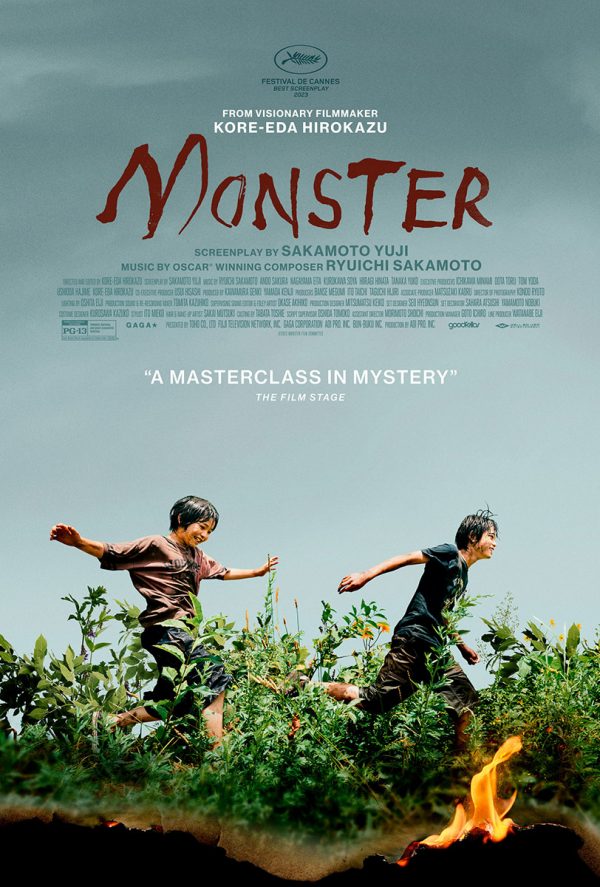
4. “Monster” (“Kaibutsu”) (Japan)
The perspective from which we view a situation infallibly provides us with a clear, irrefutable picture of its truthfulness, right? But what happens if we encounter someone who witnesses the same incident and comes away from it with a totally different interpretation? Both views can’t be “right,” can they? Or is it possible that none of us can see the totality of a scenario and claim to know everything about it? That’s the core takeaway from director Kore-eda Hirokazu’s latest feature, an ambitious, skillfully crafted tale told from multiple vantage points, all of them “correct” in their own right, despite the myriad differences that distinguish them from one another, a storytelling technique first developed by Japanese master filmmaker Akira Kurosawa in the screen classic “Rashomon” (1950). Kore-eda’s cinematic homage to the famed auteur, told in three separate but interconnected segments, focuses on the exploits of a rebellious pre-teen (Soya Kurokawa) seemingly prone to acting out as a bully. The youth’s unpredictable behavior, however, doesn’t tell the whole story. His actions appear to be cryptically interwoven with those of his overly protective widowed mother (Sakura Ando), his young middle school teacher (Eita Nagayama), his aging, softspoken principal (Yuko Tanaka), and his effervescent best friend (Hinata Hiiragi), many of whom aren’t always what they seem to be. There are forces at work here that are a cause for concern, prompting the often-asked question, “Who is the monster?”, a query that provides the inspiration for this film’s title. It’s intriguing to watch how the picture’s various story threads come together, reminding us of the old adage of not judging a book by its cover, poignantly illustrating that, no matter how much we may think we know about a particular situation, there’s a good chance we’ll never get a complete picture of it. Kore-eda serves up an eye-opening tale, one that gives us pause to think about our impressions and preconceptions in an age when many of us are all too quick to superficially judge what we see – and in a frequently flawed framework at that. The picture, winner of two Cannes Film Festival awards and nominee for a third, could stand to be a little more swiftly paced at times (especially in the final act), but this is arguably the director’s best and most sensitive work to date, one that, we can only hope, will have the kind of profound impact we need in an age where open-mindedness and tolerance are traits we could all stand to develop to a much greater degree – particularly when pieces of the puzzle are missing.
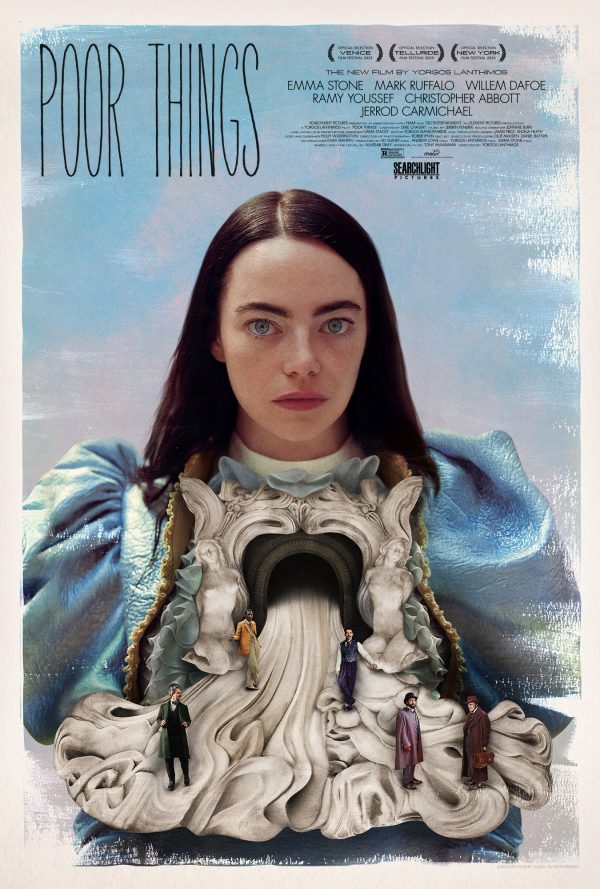
3. “Poor Things” (USA/UK/Ireland)
When the circumstances of our lives don’t suit us, it’s time to reinvent ourselves – something that happens both literally and metaphorically in this latest offering from director Yorgos Lanthimos. But the way that result comes about here represents a truly inspired fusion of genres, including comedy, romance, social commentary and sci-fi, making for one of the most inventive, unusual and hilarious releases of recent years. This offbeat feminist fable tells the story of how a pregnant, young, anonymous suicide victim (Oscar nominee and Golden Globe and Critics Choice Award winner Emma Stone) is reanimated with the aid of a brain transplant from her unborn fetus, an achievement accomplished by a colorful, controversial but well-meaning surgeon/scientist a la Dr. Frankenstein (Golden Globe nominee Willem Dafoe). He nurtures his subject back to life, health and sentience, a sometimes-challenging process that finally surfaces when she discovers her sexuality, the trigger for exploring a new, independent life for herself, both physically and emotionally. Through a series of adventures over the course of a trip through Europe with a free-wheeling, lusty but lecherous, self-serving lawyer (Oscar nominee Mark Ruffalo), she finds herself as a self-actualized woman in an age where that’s more of a rarity than a standard, particularly in a world where men treat women more like property than people. While the film’s pacing could use some shoring up in the middle, this offering nevertheless entertains with uproarious laughs throughout, even when the narrative turns more thoughtful and substantive. The superb performances by Stone, Dafoe and Ruffalo are top shelf, contributing to the picture’s whopping 11 Oscar nominations, 13 Critics Choice Award nods and 7 Golden Globe Award bids, among other honors. The film is also visually stunning in its cinematography and editing, as well as in its spectacular and whimsical production design, filled with images reminiscent of the movies of Wes Anderson and Terry Gilliam while sustaining a look all its own. Admittedly, this release features a good deal of explicit sexuality, both visually and in the dialogue, so sensitive viewers should take note. However, as one of the most anticipated pictures of this year’s awards season, “Poor Things” never disappoints, serving up a solid offering that consistently tickles the funny bone while giving audiences much to think about – and there’s nothing poor in any of that.
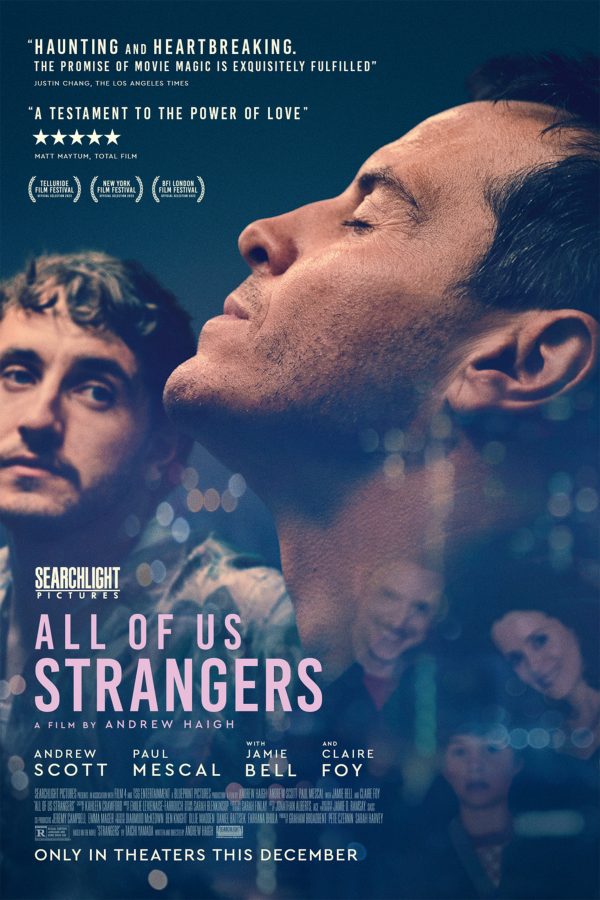
2. “All of Us Strangers” (USA/UK)
In a movie awards season that has had more misses than hits, it’s gratifying to see a picture that not only lives up to, but exceeds, its potential. Such is the case with writer-director Andrew Haigh’s latest offering, a heartwarming and heartbreaking story of love, reflection and healing all rolled into one. To say too much more about the film would invariably unleash a plethora of spoilers, but suffice it to say that it tells a genuinely moving and touching tale of a thirtysomething gay Londoner (Andrew Scott) and his budding relationship with a mysterious new beau (Paul Mescal), an involvement very much influenced by the protagonist’s relationship with his own past, most notably his involvement with his long-estranged parents (Jamie Bell, Claire Foy). This is one of those pictures that’s just about perfect in virtually every regard thanks to its stringent adherence to authenticity in the writing and the portrayals of its positively stellar cast, especially the highly underrated performance by BAFTA Award nominee Foy, whose role has puzzlingly been flying under the radar thus far. It’s also a production that will likely surprise viewers in myriad ways, defying expectations and telling a story that’s anything but apparent from what’s in its promotional trailer. Moreover, I’m impressed by the fact that this is an offering featuring gay characters in which their sexuality is not the principal focus of the narrative, something that truly distinguishes this feature from so many others in this genre. Add to these attributes a sensitively chosen soundtrack and some surprisingly innovative cinematography, and you’ve got one helluva fine movie. To be sure, this is one of those releases that, if it doesn’t touch you profoundly, you’d better check to see if you have ice water coursing through your veins. “All of Us Strangers” richly deserves whatever accolades it receives, having been nominated in most of the year’s major awards competitions (despite an inexplicable and inexcusable snub for any Oscar consideration). It’s truly one of the year’s best, bar none.
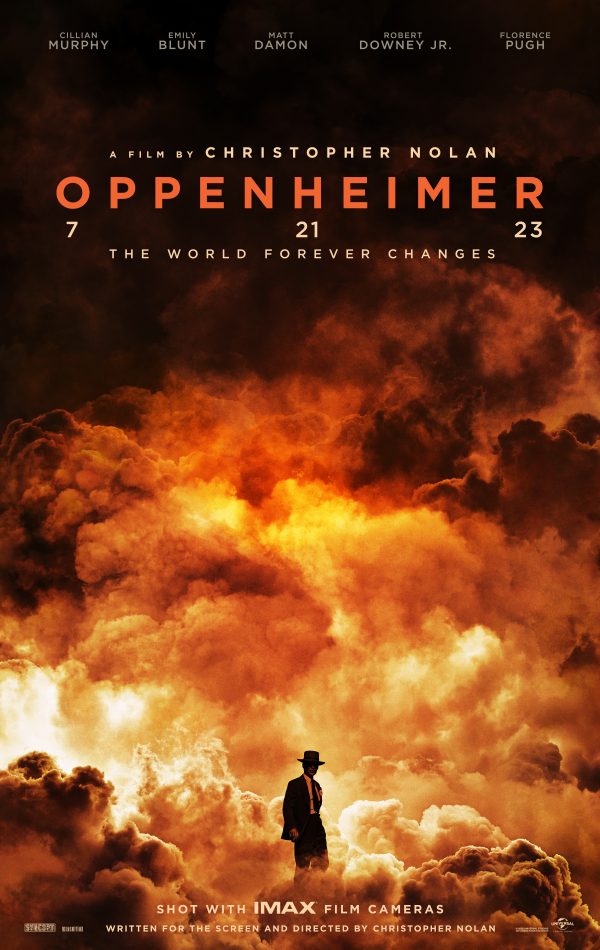
1. “Oppenheimer” (USA/UK)
Telling the story of a larger-than-life individual truly calls for a larger-than-life film, and that’s precisely what writer-director Christopher Nolan has come up with in his latest feature outing, handily the best work of his career. Nolan’s three-hour opus about the life of Dr. J. Robert Oppenheimer (Oscar nominee Cillian Murphy), director of the Manhattan Project (and more commonly known as the Father of the Atomic Bomb), provides viewers with a comprehensive biography of this brilliant and thoughtful yet often-inscrutable and naïve physicist who took on a patently dangerous venture that left him morally conflicted about the nature of his creation. The story, which spans several decades of the scientist’s life, chronicles his development of “the gadget” and the fallout he suffered as a consequence of his left-wing political leanings and his efforts to keep the released nuclear genie from getting out of control. The film is admittedly a little overlong and probably could have used some editing in the opening and final hour, but, in the interest of telling the whole story of Oppenheimer’s odyssey, its length is understandable (and, consequently, justifiable). The picture’s production values are all top shelf, especially its brilliant cinematography, stirring original score and superb sound quality, an element that truly leaves audiences with a bona fide visceral experience. Moreover, the narrative is skillfully and eloquently brought to life by this offering’s outstanding ensemble cast, including Murphy, Matt Damon, Tom Conti, Benny Safdie, Emily Blunt, Florence Pugh, Gary Oldman, Rami Malek, and, especially, Oscar nominee and Golden Globe and Critics Choice Award winner Robert Downey Jr., who delivers a stellar supporting performance showing acting chops that I never knew he possessed. “Oppenheimer” is easily the best film of 2023, garnering 13 Oscar nominations and multiple awards and nominations in other competitions. It packs a potent punch and delivers a message that we can all never hear too often, poignantly reminding us all of the importance of not falling prey to the same Promethean burden that Oppenheimer was forced to shoulder.
Honorable Mentions
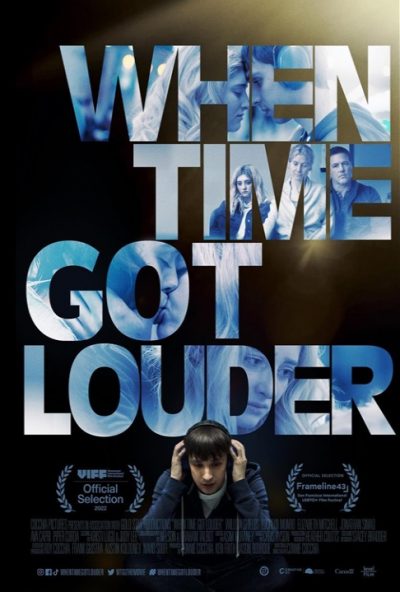
11. “When Time Got Louder” (Canada)
Finding a harmonious balance between caring for the needs of others and addressing one’s own happiness and well-being can be a difficult tightrope to traverse. So it is for the caregivers who attend to the needs of those with high-maintenance requirements, such as those afflicted with autism. For one family caring for a teenage autistic son (Jonathan Simao) – a high-functioning, extremely gifted but largely nonverbal illustrator – it takes a lot. It also takes a lot away from their own lives, often prompting profound feelings of guilt when they pursue initiatives of their own. That’s especially true when the artistic savant’s older sister (Willow Shields) goes away to college and begins pursuing a same-sex relationship with a new love interest (Ava Capri), actions that make her feel as though she’s selfishly abandoned her brother’s needs. So how do she and her stressed-out parents (Elizabeth Mitchell, Lochlyn Munro) cope with these circumstances? That’s what writer-director Connie Cocchia’s debut feature beautifully and sensitively examines, presenting viewers with a compelling, heartfelt story in which loving but hard choices must be made to take care of everyone’s needs under trying conditions. Beautifully filmed, skillfully edited through a carefully assembled series of flashbacks and backed by a deftly compiled soundtrack, this tale is effectively brought to life by its superb ensemble cast, including all of the family members and a caring but no-nonsense social worker (Sharon Taylor). The film evokes genuine emotions and does so with an organic authenticity, never becoming schmaltzy or clichéd, quite a coup for a first-time feature filmmaker. “When Time Got Louder” is one of those little-known gems that has largely flown beneath the radar, primarily playing the film festival circuit, but, thankfully, it’s now available for streaming – and a well-worthwhile viewing choice at that.
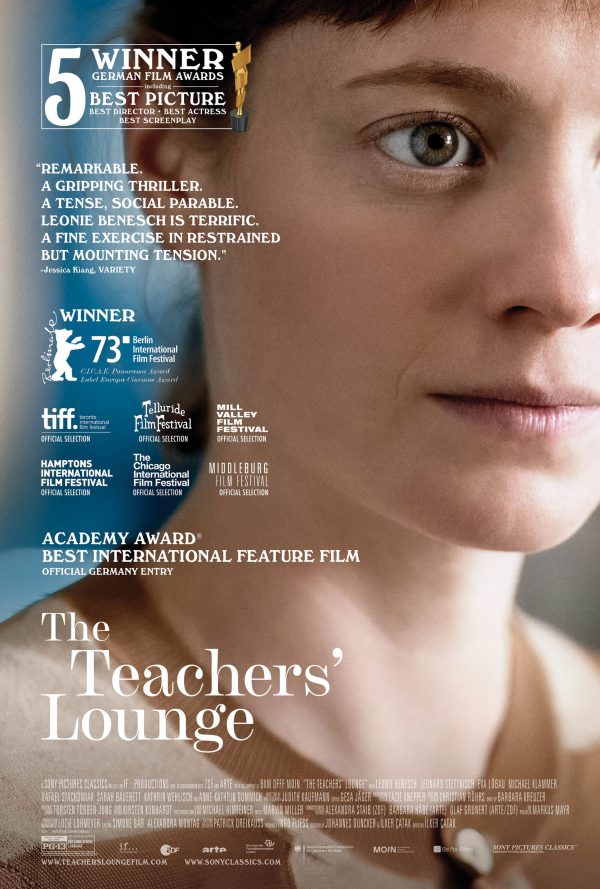
12. “The Teachers’ Lounge” (“Das Lehrerzimmer”) (Germany)
In recent years, we’ve all seen examples of incidents that start out comparatively small but that quickly get blown all out of proportion – and unreasonably so at that. As developments emerge and explode under these conditions, they often lose all sense of rationality and proportion, soon taking on lives of their own, expanding into tangential and seemingly unrelated areas that have virtually nothing to do with the event that spawned them. And, in the end, we’re left with outcomes that seem inappropriate and ill-suited to what launched these insane scenarios in the first place. That’s what writer-director Ilker Çatak explores in his latest offering, a dramatic satire about what unexpectedly grows out of a case of petty theft in the teachers’ lounge at a German middle school. Before long, the victim in this incident (Leonie Benesch) becomes swept up in a very public dust-up that leads to her becoming a very public pariah in the eyes of her peers, her students and their parents, while those in official capacities sit on the sidelines and do virtually nothing meaningful to address the issue. The situation thus serves as a microcosmic metaphor for what’s happening on a wider scale in society at large today, drawing in such ancillary elements as racial and national prejudice, the incendiary role of the media, the impact of unsubstantiated innuendo, the protection of personal privacy, the indulgence of contemporary youth, and the sway of fake news in shaping public opinion, a rather full plate of dubious and unsavory fallout stemming from comparatively meager beginnings. While some may contend that these outcomes are somewhat exaggerated in nature, they nevertheless collectively draw attention to undeniably troubling issues desperately in need of attention in our increasingly out-of-control world, global concerns that obviously transcend national borders, all punctuated here with more than a few hefty infusions of wickedly absurdist humor. Despite its Oscar nomination for best international film, “The Teachers’ Lounge” might not appeal to everyone, but, for those who enjoy movies that aren’t afraid to present biting social commentary, this should be added to your watch list. As the picture so sadly illustrates, even supposedly civil environments aren’t immune from the kind of social nonsense depicted here, a troubling teaching for all of us who are looking for a return to sanity in an increasingly crazy existence.
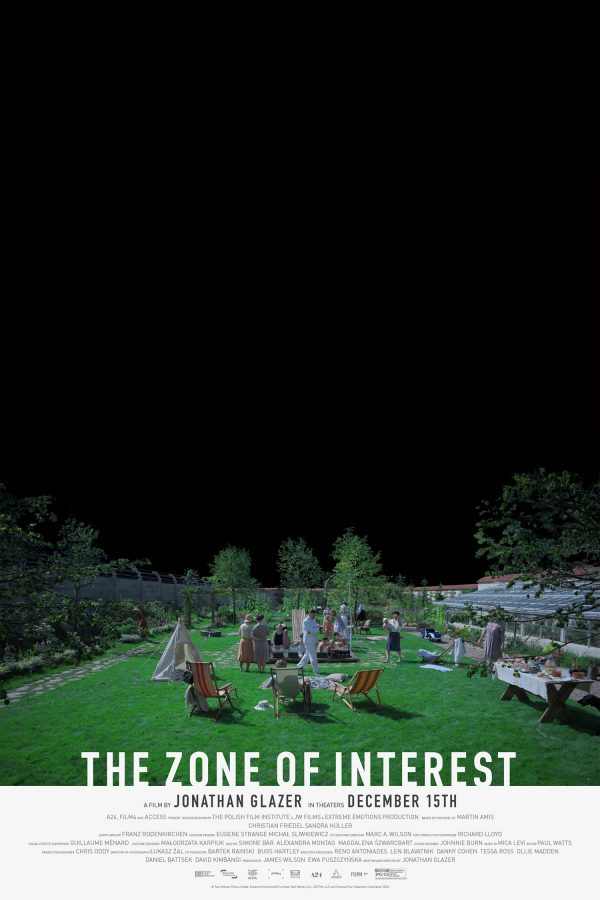
13. “The Zone of Interest” (USA/UK/Poland)
Some movies just have to be seen, even if they make for a difficult watch, and writer-director Jonathan Glazer’s latest is one of those pictures. While this offering is at times a bit uneven, when it’s on, it’s on, leaving a powerfully indelible mark on viewers, one that you feel in your gut and your heart and can’t get out of your mind. The film tells the unnerving story of the family of Auschwitz commandant Rudolf Höss (Christian Friedel). They reside directly next door to the infamous Nazi concentration camp, somehow managing to live seemingly “normal” lives in the shadow of this horrendously notorious facility. What’s most chilling, however, is that the family seems largely oblivious to the atrocities taking place on their doorstep, focusing more on their social activities and material possessions instead, even with the routine sounds of gunfire and the sight of billowing smoke from mass crematoriums filling the surrounding skies. In portraying this, the filmmaker doesn’t need to resort to graphic, gratuitous imagery to make his point about the unspeakable acts unfolding so close to home; comparatively simpler depictions of these events (and their aftermath) speak volumes instead, creating some of the most implicitly unsettling sights ever captured on film. As a consequence, this approach really makes one wonder how anybody could be so wantonly callous and unfeeling, making for truly troubling viewing. Yet it’s also the kind of imagery that has to be seen for its full impact to sink in. This Oscar nominee for best picture – and the recipient of numerous other competition and film festival accolades throughout awards season – richly deserves the attention it has garnered, even if it’s an inherently disturbing watch (sensitive viewers take note). To be sure, there are some pacing issues that could stand to be rectified, and a few story threads could use better clarity, but the picture’s superb cinematography and fine performances by its excellent ensemble cast (especially Sandra Hüller as the commandant’s self-absorbed wife) are undeniably noteworthy. This might be a film that no one wants to screen – but that everybody nevertheless should.

14. “Tótem” (Mexico/France/Denmark/Netherlands)
The everyday lives of average individuals ordinarily might not make for especially engaging storytelling. However, when they’re framed within the context of extraordinary circumstances, they take on an added new dimension, as witnessed in the second offering from Mexican writer-director Lila Avilés. This warm, heartfelt, bittersweet comedy-drama tells the endearing story of a family hosting a birthday party for Tona, a young, beloved painter battling advanced cancer (Mateo Garcia Elizondo), told largely through the perspective of his seven-year-old daughter, Sol (Naíma Sentíes), who hopes against hope for her father’s recovery. As events play out, viewers watch as Tona’s family makes preparations for the celebration – often involving simple tasks told with delightfully funny twists that provide much-needed comic relief – as well as the various means with which his relatives are dealing (or not dealing) with an apparently impending inevitability that no one really wants to address or discuss. Yet what might seem destined to be an exercise in forced festivities with an underlying sense of morbidity turns out to be a loving, earnest celebration of life, despite the undeniable presence of an unwanted, intangible “guest” lingering in the background. While the film incorporates a few sequences that are inherently a little too incidental in nature compared to the larger overall narrative, “Tótem” nevertheless serves up a charming, touching, authentically presented tale that reaches out to audiences and surrounds them with sincere, loving feelings and a big, well-earned hug. This National Board of Review winner and Independent Spirit Award nominee is a fine, little-known indie gem that will surely move you, even if it leaves you with uncomfortably mixed feelings as its story unfolds. It effectively illustrates that there indeed can be times of boundless, overwhelming joy even in the face of overwhelming lament but that what ultimately matters most is what we make of these circumstances when they play out, especially when it comes to expressing how we feel for those whom we truly care about most.
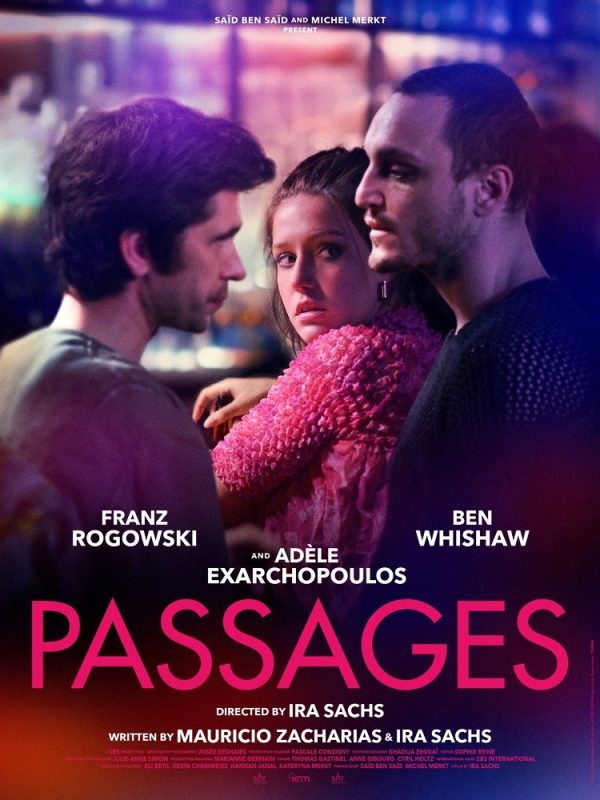
15. “Passages” (France/Germany)
Intimacy can be a beautiful thing. However, it can also become something messy, hurtful and emotionally devastating when tainted by self-serving agendas, irresponsible intentions, or reckless, short-sighted experimentation, influences that can purposely or unwittingly end up wreaking widespread havoc. Such is the case in writer-director Ira Sachs’s new domestic drama about a flamboyant, free-spirited gay male filmmaker, Tomas (Independent Spirit Award nominee Franz Rogowski), who impulsively jumps into an impromptu fling with a woman, Agathe (Adèle Exarchopoulos), a relationship that leaves his longtime husband, Martin (Independent Spirit Award nominee Ben Whishaw), unsure of what the couple’s future might hold. As time passes, circumstances grow increasingly complicated as each member of this unlikely trio tries to sort out what lies ahead, particularly with the emergence of Tomas’s ever-growing thoughtless capriciousness. With four Independent Spirit Award nominations, some viewers may look upon the story’s shockingly reprehensible developments as improbable and appalling, but, sadly, as anyone who has ever watched tabloid TV can probably attest, the events depicted here might not appear as far-fetched as one might think. In that respect, this offering presents a bold, courageous, honest look at what can go awry in situations like this, an account loaded with incensed outrage, unbridled ire, biting humor and more than a little cynicism. It’s a narrative that some audience members may find offensive, even deplorable, but, like a horrific car accident, it’s also something that many viewers might find difficult to look away from, thanks in large part to the wholly convincing performances of the three protagonists. Sensitive viewers should be aware that the film includes a fair amount of explicit and provocative sexual content, so those easily offended by such material may not want to put this one on their watch lists. However, for those who appreciate domestic dramas that hold nothing back and that aren’t afraid to get down and dirty in their portrayals of what can happen, this release is about as good as any out there. Just be prepared to be left with your jaw agape – and your head spinning.
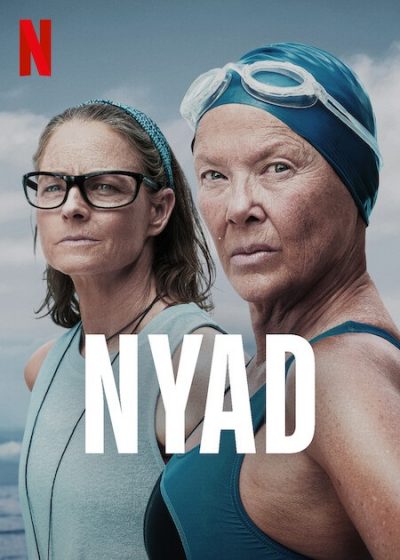
16. “Nyad” (USA)
It’s been said that it’s never too late to pursue one’s dream. But how many of us who are getting on in years actually make the effort to accomplish that? As time passes by, we may begin to feel like life is passing us by, too, sweeping away the opportunities to fulfill those aspirations and leading to relentless disappointment, frustration and depression. So it was for famed marathon swimmer Diana Nyad (Oscar and Golden Globe Award nominee Annette Bening) as she entered her senior years. Having accomplished much as a long-distance open water swimmer as a young adult, she subsequently became a broadcaster for ABC Sports, serving as an expert on the subject. But that work didn’t provide the same satisfaction as what she was born to do, an undertaking that made her feel like she had taken a 30-year detour in her destiny. That changed, however, when she decided to get back in the water and attempt to make the 103-mile swim from Havana, Cuba to Key West, FL, a long-cherished dream she tried but failed at when she was 28. At 60, however, she believed she could still do it, and so she set off on a quest to complete it, a pursuit that everyone said was unrealistic and impossible at her age. As a headstrong, never-say-die force to be reckoned with, though, Nyad forged ahead with her best friend, Bonnie (Oscar and Golden Globe Award nominee Jodie Foster), serving as her often-beleaguered coach. Directors Jimmy Chin and Elizabeth Chai Vasarhelyi bring this fact-based story to life in this engaging biopic, chronicling Nyad’s odyssey and, in the process, never shying away from portraying the fabled swimmer from all angles, both as a heroic, determined role model and as an off-putting, obstinate pain in the butt. The storytelling approach is admittedly somewhat formulaic and a tad overlong, but the picture’s overall execution provides an authentic depiction of the grueling ordeal Nyad and her crew underwent, all effectively brought to life by the star power of Bening and Foster in their respective roles. The film also provides Nyad’s childhood back story, illustrating how she steeled her lifelong resolve for success and refused to play the part of a victim when the going got tough. It’s also refreshing to see a release that’s not afraid to showcase the story of an older woman, an often-overlooked demographic in contemporary cinema about a character who just might have something worth saying. “Nyad” probably doesn’t qualify as epic filmmaking, but it certainly makes the most of everything it has to work with, presenting viewers with an entertaining and inspiring watch, especially for those who feel cast aside and reconciled to their circumstances but who still have a burning desire for excellence aflame within them.
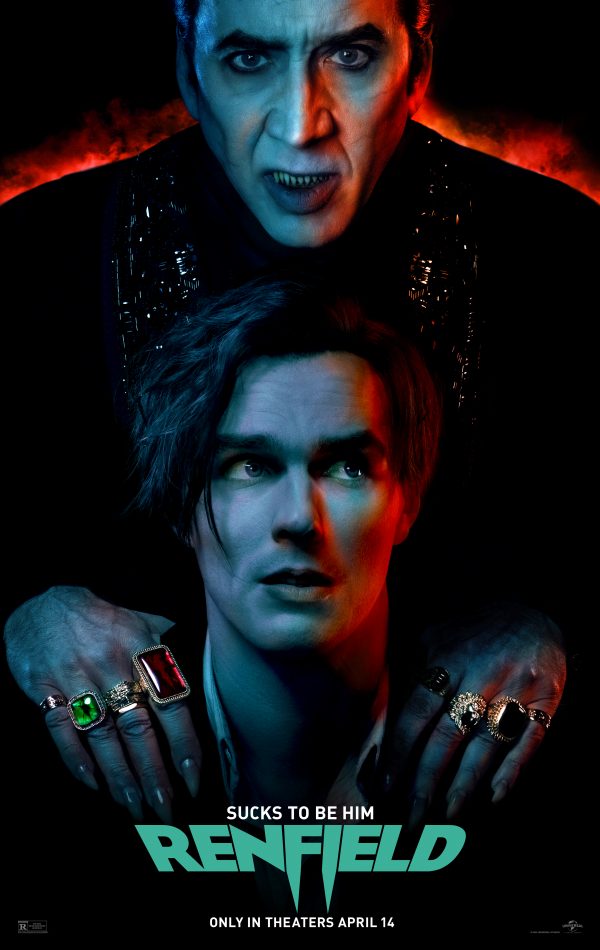
17. “Renfield” (USA)
I must admit that I had some doubts about this one going in. Those who know me are well aware that I’m not a huge fan of horror flicks (unless they’re smart horror or campy comedic romps). But director Chris McKay’s refreshingly humorous take on the Prince of Darkness mythology as told through the eyes of his longtime personal assistant, Robert Renfield (Nicholas Hoult), pleasantly surprised me. As a melancholic soul who’s looking to get more out of life than the perpetuation of his unfulfilling tenure as a glorified go-fer for Dracula (Nicolas Cage), Renfield seeks to change his destiny. He begins the process by joining a support group for those seeking to escape toxic, co-dependent relationships. And, not long thereafter, when he learns that his boss has teamed up with a powerful New Orleans mob family in a fiendish plot to take over the world, Renfield joins forces with an assertive, idealistic police officer (Awkwafina) to both take back his personal power and thwart the evil schemes of the conniving, overzealous vampire. Considering the story’s horror roots, there’s plenty of blood-dripping gore as this yarn unfolds, but it’s all presented with a delightfully whimsical, albeit macabre sense of play, especially in its exceptionally well-choreographed action sequences. The narrative also features ample send-ups of the self-help/personal growth community, a story element perfectly juxtaposed to the picture’s other more visceral (in every sense of the word) content, one that subtly and surprisingly has something meaningful to say in the midst of this offering’s pervasive chaos. Admittedly, the pacing lags in a few spots, and the meshing of the story threads could have been handled a little more deftly at times. Nevertheless, despite these modest missteps, the laughs are definitely in huge supply here, thanks in large part to the film’s excellent cast, including the fine performances of Hoult as the lost but transformation-minded milquetoast and Shohreh Aghdashloo as an oily, glamour-puss mob matriarch. But the one who really steals the show here is Cage, who turns in his best work in years (perhaps even of an award-worthy caliber), memorably embodying the character of Dracula and genuinely making it his own, much like what Michael Keaton did with Beetlejuice and Ryan Reynolds has done with Deadpool. “Renfield” is truly a lot of fun, skillfully blended with substantive, deceptively nuanced material wrapped up in a vehicle where such content is least likely expected. So go sink your teeth into this one; you’re sure to have a bloody good time.
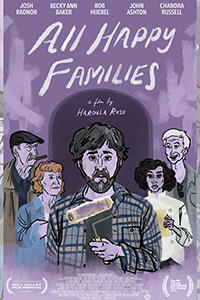
18. “All Happy Families” (USA)
Movie portrayals of family life often leave much to be desired when it comes to authenticity (especially for offerings on the Hallmark Channel). So it’s genuinely refreshing when a film comes along that depicts these stories with honesty while being eminently entertaining at the same time. Such is the case with writer-director Haroula Rose’s second feature outing about a Chicago family going through a variety of transitions that become ironically (and often hilariously) interconnected, all served up with sparkling wit and an excellent array of one-liners that are definite zingers without being hurtful or nasty. The construction of the narrative and its accompanying screenplay are meticulous and economical, moving along with a steadily sustained pace and never getting bogged down by prolonged sequences that languish or lose their zest, much in the style of director Nicole Holofcener’s works. All of this is brought to life by a finely assembled ensemble cast, especially its four principals (Josh Radnor, Rob Huebel, John Ashton and Becky Ann Baker), but also in its palette of intriguing supporting players. What’s more, the film does a superb job in its depiction of Chicago’s people and neighborhoods, presenting an authentic look and feel of the Windy City, one that residents of the Second City will relish and appreciate. “All Happy Families” is one of those offerings that aren’t widely seen (or made) anymore, but it’s one of the best I’ve screened in a long time. This charmer deserves a general release and a robust fan base. Let’s hope it gets both.

19. “Juniper” (New Zealand)
Individuals seeking to sort out their personal challenges sometimes need to work together to achieve meaningful results. What’s more, strange as it may seem, these situations often call for the formation of unlikely pairings to attain desired outcomes. Such is the case in writer-director Matthew J. Saville’s debut feature about the unusual and stormy but beneficial relationship between a troubled teen (George Ferrier) mourning the loss of his mother and his prickly, salty-tongued English grandmother (Charlotte Rampling), a retired, independently minded war correspondent with a drinking problem who’s convalescing from a severely broken leg at the family’s remote New Zealand farm. What begins as a reluctant, seriously strained connection between two nonconformists gradually evolves into a knowing bond between a pair of mavericks who recognize, celebrate and act upon their unconventional impulses, acts that allow them to fulfill their potential as strong-willed individuals who aren’t timid about fully and freely being themselves. In many ways, this is not the kind of association that one would expect to develop under circumstances like these, a development that gives this story a fresh take on intergenerational relations. But that’s also why the film disappoints somewhat by ultimately falling back on a somewhat predictable narrative line and not allowing its innate strength to become as fully fleshed out as it could have been, particularly where the revelation of motivations is concerned. Nevertheless, those shortcomings are made up for by the picture’s gorgeous cinematography of rural New Zealand, as well as the excellent break-out performance of Ferrier and the positively outstanding portrayal of Rampling, who handily turns in some of the best work of her career here. “Juniper” may not live up to everything it could have been, but it has a lot going for it that’s well worthwhile, especially in its ability to move audience members as the story plays out. Enjoy what makes this moving comedy-drama work, but be sure to keep those hankies handy.
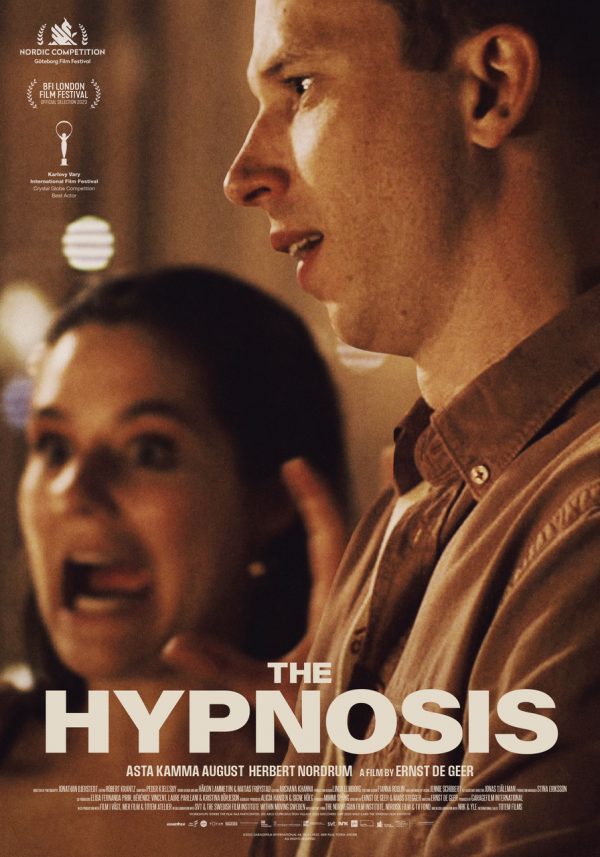
20. “The Hypnosis” (“Hypnosen”) (Sweden/Norway/France)
Sometimes we can all use a little help in changing our behavior when we aren’t able to do so on our own, and hypnosis is one of the most commonly employed practices. But, in some cases, it can work so well that we may unintentionally end up overcompensating, prompting us to act out in ways that yield a whole new crop of issues to contend with. Such is the case with Vera (Asta Kamma August), who gives hypnosis a try to quit smoking, a behavior she regards as unhealthy and antisocial. However, Vera’s hypnotherapist (Karin de Frumerie) suspects that her patient’s reluctance in explaining her reasons for seeking out treatment suggests that she’s there for more than just kicking the habit. This hunch leads her to conduct a profoundly impactful hypnotherapy session that produces a radical, albeit somewhat ill-defined, change in her subject’s behavior. And, even though Vera seems to relish the effects of this change, it couldn’t have come at a worse time: just as Vera and her business and romantic partner, André (Herbert Nordrum), are about to pitch their new commercial venture to a group of select international investors at an elite pitch fest, an event where they receive guidance from a high-profile pitch coach (David Fukamachi Regnfors). During preparation for their presentation, Vera begins acting strangely unpredictably, even disorderly, toward others, including those whom she and André are most trying to win over. So what’s going on here? And what, if anything, can André do to salvage matters before everything falls apart? Writer-director Ernst De Geer’s delightfully quirky debut feature takes a humorously absurdist look at questions of social conformity, particularly when it comes to differentiating behavior that’s gleefully playful from that which is wholly unacceptable, especially in earnestly serious “grown-up” situations. It accomplishes this goal through a captivating mix of hilariously dry wit and cringeworthy drama, one that often makes viewers squirm while questioning exactly what’s going on. In fact, at times, the mix can be perplexing enough that audiences may be uncomfortably puzzled by what’s transpiring on the screen and what the director is going for – that is, until the surfacing of the big reveal, the one that exposes the source behind the emergence of Vera’s erratic behavior, one that plants a rollicking punctuation mark on this often-uproarious offering. Much of the credit for this goes to the film’s fine script and its superb ensemble cast, particularly protagonists August and Nordrum, who play off each other well and create a wry sense of humorously driven dramatic tension. I love movies that make it a point to stick pins in sanctimonious balloons and push over sacred cows, and this one does as good a job at that as I’ve seen in a while. “The Hypnosis” may not be everyone’s cup of tea, but I’m only too happy to take more than a few good sips. Pass the milk and lemon, please.
Noteworthy (In Alphabetical Order)
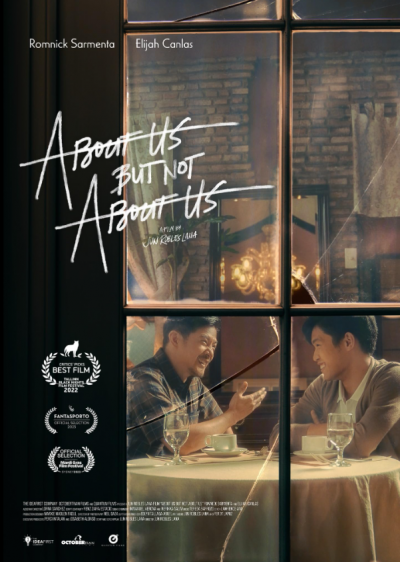
“About Us But Not About Us” (Philippines)
How well do we understand the situations we find ourselves in? Most of us probably think we have a pretty good handle on them much of the time. But, when a gay, middle-aged Filipino college professor (Romnick Sarmenta) meets with one of his students (Elijah Canlas) whom he hasn’t seen for a while but toward whom he had shown preferential, nurturing treatment at one time, what starts out as a pleasant lunchtime reunion slowly turns into a series of troubling eye-opening revelations. Told through what seems like a seemingly innocent, somewhat innocuous conversation between the duo, writer-director Jun Robles Lana’s latest opens like a latter-day version of “My Dinner with Andre” (1981) but slowly turns unexpectedly dark and sinister, shedding a whole new light on the now-surprisingly deceptive opening act. As a result, what starts out as a seemingly harmless, slightly tedious encounter becomes engrossingly captivating as the true nature of each of the characters is revealed. The picture’s multilayered narrative grows ever more absorbing the further it plays out, showing us just how easily it can be for us to be deceived by circumstances, including in situations where we think we know the score but don’t. It also presents viewers with an intriguing look at how we can be mirrors of one another but never recognize the similarities until they’re squarely shoved in our face. (And who would have thought that watching two people eat a meal and talk could be so engaging?) “About Us But Not About Us” is a delicious little cinematic nugget that will likely leave audience members’ mouths agape by picture’s end, especially when looking back at how things start out and how they eventually wind up, putting a delightfully surprising spin on the film’s skillful incorporation of ambiguously cynical elements whose meanings don’t become fully apparent until the credits roll. Don’t be quick to give up on this one; it’s worth the wait to see what it delivers – and how well it does so.
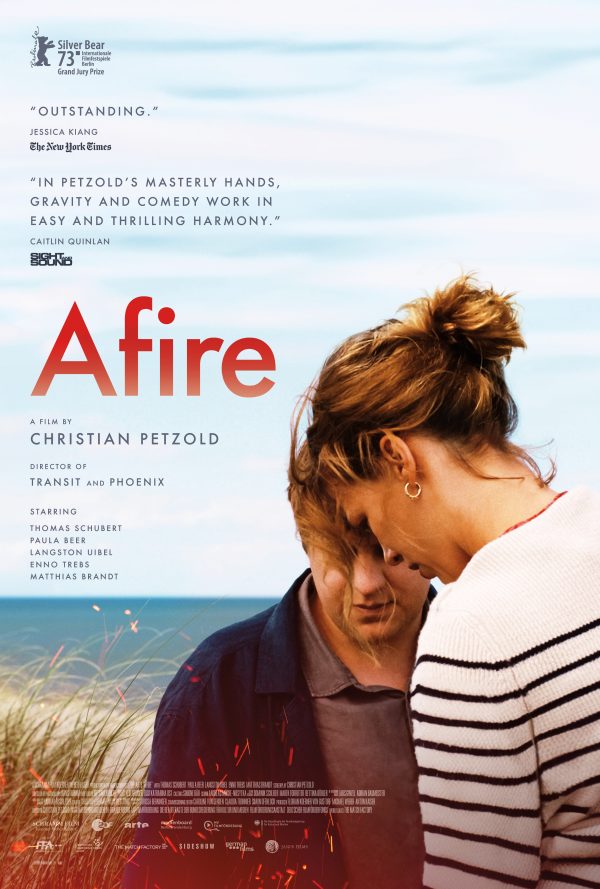
“Afire” (“Roter Himmel”) (Germany)
Fire is a force that can destroy and devastate, but it’s also one thar can cleanse, sweeping away what’s of questionable value in order to clear space for robust, vigorous, valued new growth. And, sometimes, it can do both simultaneously, as demonstrated in writer-director Christian Petzold’s latest, a searing drama/wry comedy about four old/newfound friends who are unwittingly drawn together at a summer house near the Baltic seacoast. Their time together proves revelatory, stressful and enlightening, in part because of their interactions, the disclosures that come out of those relationships, and the looming threat of ravaging forest fires that threaten them and their existence, both literally and metaphorically. The film is a slowburn in every sense of the word, especially at the outset, with a somewhat cryptic narrative that seems rather meandering at times, but that sets the stage for what’s to follow in the back half. The picture subsequently presents a witty but profoundly insightful examination of what makes us who we are, how much we enjoy or endure our lives, and what we can do to make it better for ourselves when we eliminate what no longer serves us. In many respects, “Afire” is probably not what most viewers will expect, but, then, that’s a huge part of its appeal, a refreshing, engaging look at life and what we make of it, a valuable exercise given how abruptly it can all be taken away, leaving us to ask ourselves, what did we do with the time we had and was it indeed worth it in the end? Give this one time to unfold, and let it sink in. It may help you realize and understand more about yourself than you can possibly imagine.
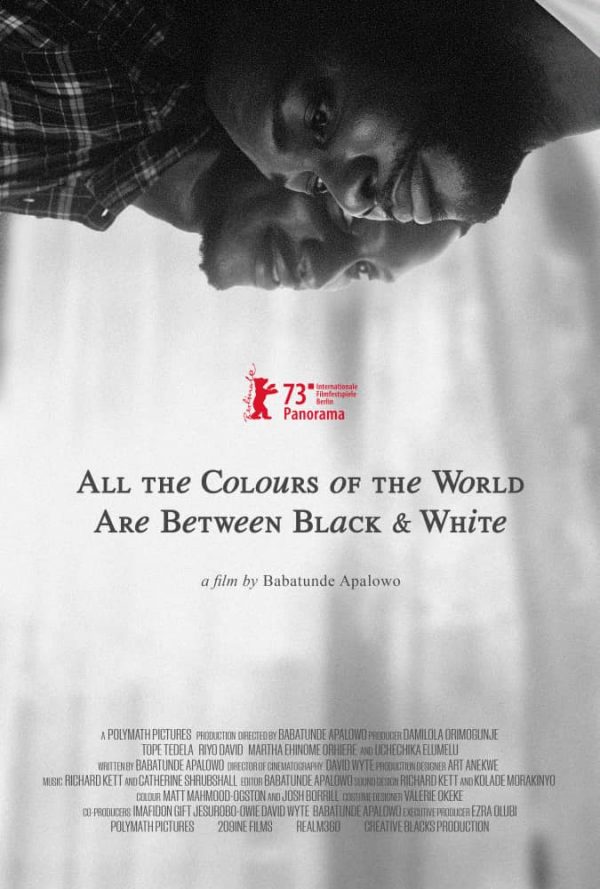
“All the Colours of the World Are Between Black and White” (Nigeria)
Despite the considerable social progress that the LGBTQ+ community has made in recent years, there are still some places around the world where the act of coming out is questionable and deeply troubling. In some cases, such a step raises serious issues about social acceptance, as well as self-preservation and legal ramifications. It may even prompt some individuals to doubt their genuine intuitive impulses about their natural inclinations just to be able to fit in (and stay alive). Such is the case in Nigeria, as depicted in the debut feature from writer-director Babatunde Apalowo, a Nigerian-born filmmaker based in the UK. In his first feature release, Apalowo tells the story of Bambino (Tope Tedela), a motorcycle deliveryman who meets and befriends Bawa (Riyo David), an aspiring photographer with whom he starts spending considerable time, a connection that carries implications greater than just friendship. However, given the country’s social taboos and illegality considerations, as well as sustained pressure from Efeyinwa (Martha Ehinome Orhiere), a neighbor who wants to become Bambino’s wife, the budding relationship between the two men remains at arm’s length. Bambino has doubts about his own sexuality, while Bawa believes that he and his new companion are destined for something deeper and more meaningful. But will that happen? The film probes this question as the two men tenuously circle one another, trying to figure out what’s next. Admittedly, the pacing here can be somewhat on the slow side at times, but that’s understandable given the circumstances under which they’re operating. But, by taking this approach, the filmmaker has an opportunity to present their story in a highly sensual way, one that creates ample sexual tension that’s fittingly augmented by the picture’s carefully framed shots, many of which allow the actors to convey tremendous depth of feeling merely with facial expressions and body language. The tone, message and style of filmmaking are all reminiscent of filmmaker Barry Jenkins’s Oscar-winning best picture “Moonlight” (2016), a perspective that carries significant ramifications in a culture that often denies the very existence of gay individuals within its ranks. The film thereby provides a revelatory look into a segment of society that many don’t recognize, understand or acknowledge. Like this film’s American counterpart, however, it’s imperative that viewers have patience with this one, giving it time to develop and emerge with a story that’s heartfelt, eye-opening, and, above all, rewarding.
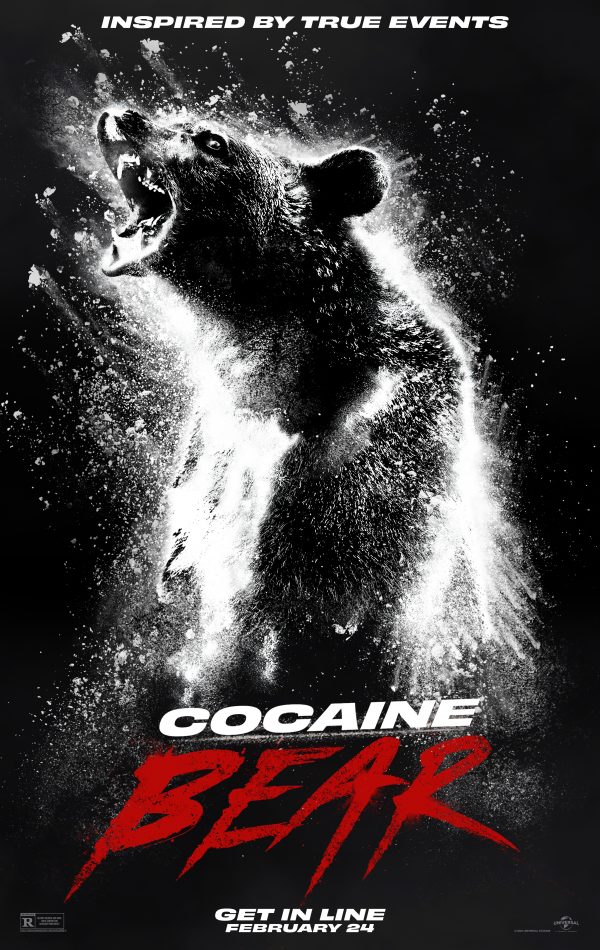
“Cocaine Bear” (USA)
From the film’s title, you can probably guess that this is a one-joke movie, a premise borne out in the trailer and in the picture itself. But, frankly, who cares? This delightfully campy dark comedy arguably has a few pacing and editing issues, as well as some bits that fall a little flat, but it’s generally a filling smorgasbord of over-the-top, goofy, gory fun. Director Elizabeth Banks’s third feature outing definitely won’t appeal to everyone because of its rampant silliness and its gratuitous shock value that’s more than a fitting homage to the cheesy, tacky 1980s slasher movies reminiscent of the time frame in which this fact-based true story is based. In essence, the premise is a simple one: a plane carrying an enormous stash of the powdery white substance crashes in the Chattahoochee National Forest, depositing its cargo within reach of a CGI-generated black bear who immediately becomes hooked on this find and embarks on an out-of-control murderous rampage, taking down an array of characters who have varying connections to the locale, the payload or other related considerations. And, yes, for what it’s worth, this soon becomes a one-note narrative, but the note is played differently every time it’s struck, with funny little twists and ever-more grisly (but creatively hilarious) imagery thrown in for good measure, the kind of laughs typical of cult classics and the fare of midnight shows. This offering also features fine performances by the likes of Margot Martindale, Christian Convery and the late Ray Liotta in his final screen portrayal, all of whom were good sports in recognizing the high-camp factor of this material. Look, let’s face it, drugs are often an inherently funny source of gut-busting humor (more so here literally than in many other cinematic vehicles), so just go with it on that level rather than trying to assess it otherwise – and running the risk of succumbing to the logic contained in the screeds of tiresome, droll, stick-in-the-mud naysayers (as many allegedly esteemed critics have written about in their dour, dull, joyless, overly somber evaluations). Enjoy this one in the kitschy spirit in which it was intended – and ignore anyone who screams “just say no.”

“Exodus” (Sweden)
The refugee crisis (especially those escaping from Syria) is an issue that is finally getting its due cinematically, first with the Netflix fact-based offering “The Swimmers” (2022) [https://brentmarchant.com/2023/02/15/the-swimmers-illustrates-how-to-beat-the-odds/] and now with this impressive debut feature from writer-director Abbe Hassan. The film follows the odyssey of a young Syrian girl (Jwan Alqatami), travelling alone, who flees to Turkey from her homeland on her way to Sweden for a reunion with her sisters and parents. But, upon exiting the crowded shipping container that transported her on the first leg of her journey, she’s met with a raid by Turkish immigration authorities, barely escaping in the unexpected company of one of the exploitive smugglers who organized her flight to freedom (Ashrof Barhom). Thus begins a trek through Europe as this seemingly mismatched duo makes its way to Sweden, a perilous trip that embroils the protagonists in an engaging array of challenges and revelations, especially the uncovering of the many different sides of these complex characters, superbly portrayed by Alqatami and Barhom. As this story plays out, the filmmaker effectively weaves together elements from a variety of genres, including action-adventure tales, thrillers, emotionally touching dramas and road trip/buddy movies, successfully depicting the refugee saga for it truly is – a bittersweet experience filled with joys, triumphs, disappointments and tragedies. It draws much-needed attention to the plight of these downtrodden souls seeking safety from an insane conflict that’s needlessly displacing so many innocents caught in the crossfire, just one of many such clashes currently occurring around the world. “Exodus” is a genuinely compelling watch, one that truly deserves a mainstream theatrical distribution, as well as recognition for the attention it so absorbingly draws to this urgently heartbreaking crisis.
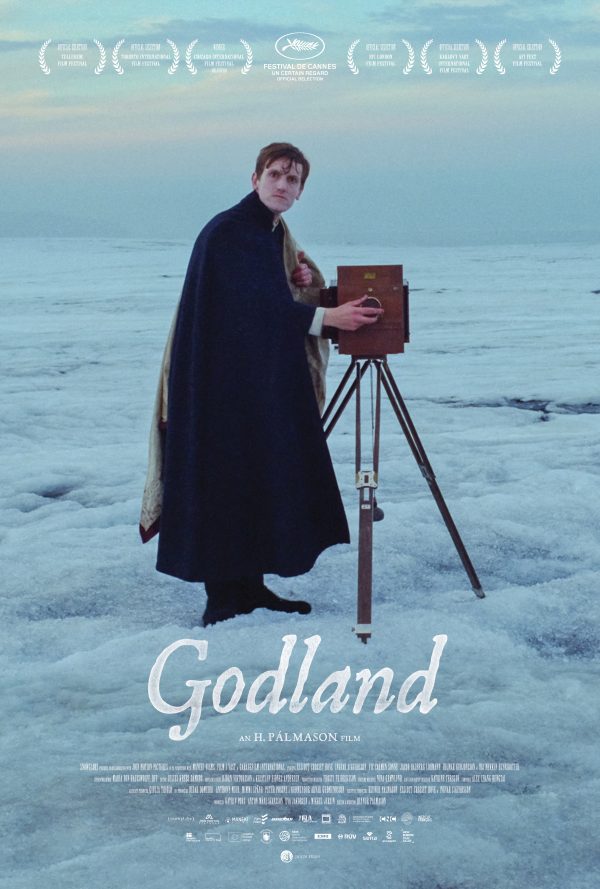
“Godland” (“Vanskabte land”) (Denmark/Iceland/France/Sweden)
What is God? Is it a reasoned, rational civilized entity or a wild, untamed force full of unrestrained power in search of being reined in? And, in light of that, then, what kind of relationship are we supposed to have with this elusive divine enigma? That’s one of many unexpected challenges put to a young Lutheran priest (Elliott Crosset Hove) who’s charged with building a church in a small community of Danish immigrants transplanted from the homeland in late 19th Century Iceland, the so-called “unforgiving island.” But, rather than sail directly to his new future home, he chooses to land on the island’s southeastern coast and cross the diverse terrain to his destination, partly to get to know the land and its people but also to indulge his hobby as a pioneering photographer. Once there, however, he gets more than he bargained for, given the difficulty of the journey and the many extreme differences in language, sensibilities and rugged lifestyle compared to the more genteel Denmark he left behind. This combination of elements tests his wits, his patience, and, above all, his faith, as events unfold in unforeseen and potentially disturbing ways. It’s an evolutionary journey for which he’s unprepared and often unable to fathom, prompting him to question much of what he believes and how he conducts himself. The result is a thoughtful meditation on these issues, featuring positively stunning cinematography, fine performances and superb production values. The pacing is surprisingly well balanced, too, especially for a film with a 2:23:00 runtime, though some of the picture’s montages – as beautiful as they are – probably could have been dialed back somewhat without significantly impacting the finished product. Writer-director Hlynur Pálmason’s fact-inspired tale is arguably his best work to date, but be sure to give this one the time that it deserves to thoroughly appreciate and enjoy it, both for its sheer beauty and for everything it has to say about the divine and the place it occupies in our lives.
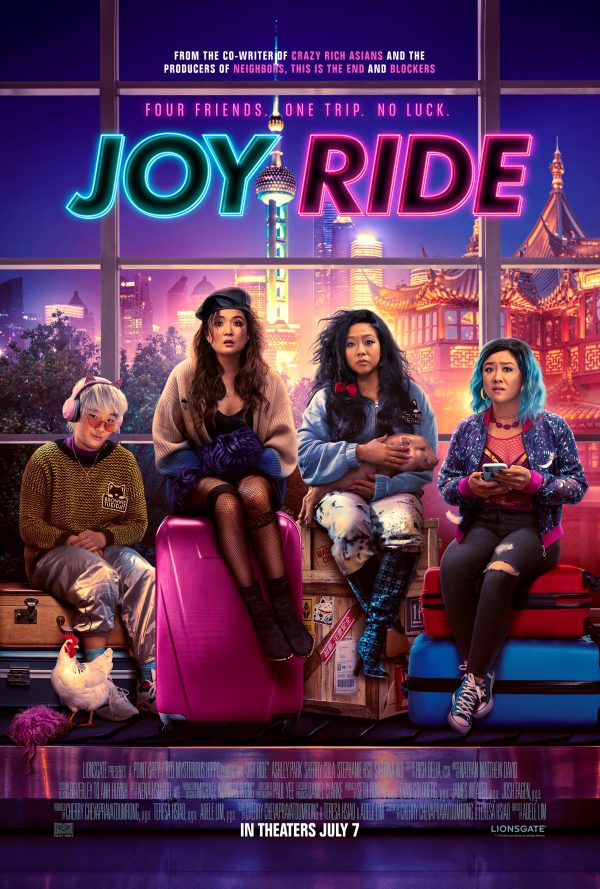
“Joy Ride” (UK/USA)
Bawdy, raunchy humor generally isn’t my style, but, when it’s done with wit, creativity and no-holds-barred originality, it gets my attention quickly, which this filmmaking debut from writer- director Adele Lim captures from the very first line of the picture (and never lets go thereafter). This rapid-fire screwball comedy follows the exploits of four young Asian women (Ashley Park, Sherry Cola, Sabrina Wu, Stephanie Hsu) on an outlandish road trip through China that steadily deteriorates and routinely places them squarely in a host of raucously hilarious, debauchery-riddled situations. In doing so, the film steadily serves up huge laughs in a story that’s accurately billed as a release unlike anything that moviegoers have seen before. While it’s true that the narrative stretches credibility a bit at times and the film has its share of predictable and sweet but sappy moments, those minor faults are vastly overshadowed by its many strengths, including its fine ensemble cast, balanced pacing, and vibrant, colorful, superbly crafted production design. Because of the nature of the humor, however, sensitive viewers may want to skip this one (though it’s truly hard not to laugh, no matter how conservative one’s views might be). “Joy Ride” may not have received much fanfare or pre-release publicity, but it’s one of the funniest comedies to come along in quite some time, and it proved to handily be one of the best offerings of 2023’s stunningly disappointing summer movie season. Indeed, get ready to seriously laugh your ass off with this one.
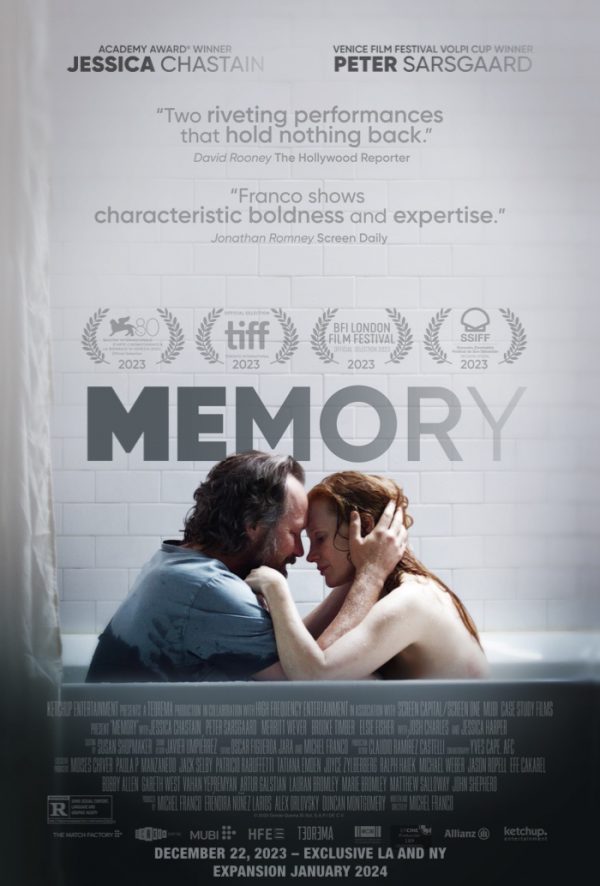
“Memory” (USA/Mexico)
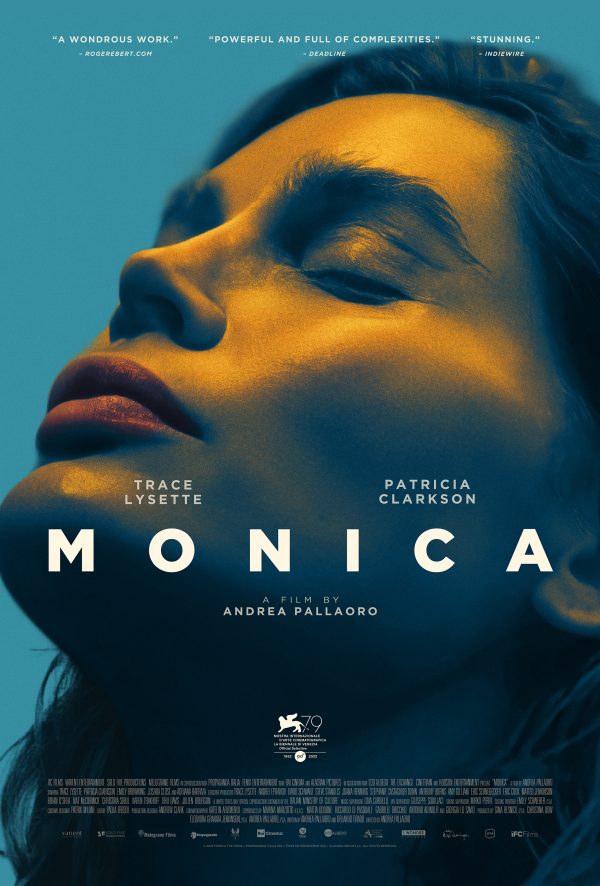
“Monica” (Italy/USA)
Acceptance, reconciliation and forgiveness are arguably among the hardest feelings for many of us to deal with, but coming to terms with them is by no means impossible. When Monica (Trace Lysette), a transgender woman kicked out by her family as an adolescent, leaves her Midwestern home and heads to California to start a new life, she struggles to get by. And, after years of effort, she indeed manages to work it out for the most part. But, years later, when Monica’s sister-in-law (Emily Browning) informs her that her long-estranged mother (Patricia Clarkson) is terminally ill, she’s torn about what to do. Should she ignore the news or step up as a dutiful child? She reluctantly relents and heads back to Ohio to help care for the woman who threw her out of the house, a situation made more complex by the fact that her mother’s malignant brain tumor has seriously affected her memory, leaving her unaware of the identity of the new caregiver who has suddenly appeared in her life. Writer-director Andrea Pallaoro’s third feature outing presents a deftly nuanced, sensitively handled story of a family painfully torn apart trying to put itself back together again under trying circumstances and while there’s still time. The pacing comes across as somewhat slow (undoubtedly by design), so those expecting material that moves along at a brisk, breezy clip may not find it to their liking, but, given the profound nature of the subject matter, it suits the narrative perfectly. There are admittedly a few plotline gaps here and there, but they’re more than adequately compensated for by the film’s superb ensemble cast, razor-sharp writing and gorgeous, atmospheric cinematography. “Monica” may not have received much fanfare upon its theatrical release early in 2023, but this fine streaming offering is well worth the time, providing viewers with a moving cinematic experience that many of us can probably relate to – and whose wisdom should be thoughtfully considered should the need arise in one’s life.

“Nuovo Olimpo” (Italy)
Old friends long separated are said to have a deeply rooted connection to one another that allows them to pick up where they left off no matter how long they’ve been apart. The same is arguably true for those who were once romantically linked but have been on their own for some time. And that heartwarming sentiment comes to life loud and clear in this touching but bittersweet Italian love story about two young men (Andrea Di Luigi, Damiano Gavino) who meet in passing and briefly fall madly for one another, only to be separated by unforeseen circumstances not long thereafter. With no way to contact one another, they thus lose touch and go their separate ways, but their unspoken mutual passion never dissipates, as becomes apparent over the next 30 years until another chance encounter unexpectedly reunites them. But what are they to do then – pursue their hearts’ desire or remain committed to the new lives they’ve created for themselves? Those surrogate existences don’t possess the same passion as what they’ve held in their hearts for each other for so long, but can they realistically walk away from what they’ve built? In many ways, writer-director Ferzan Özpetek’s latest has a robust streak of romantic universality running through it, one whose essence extends beyond the scope of the LGBTQ+ community and effectively embodies the overarching notion that love is love, no matter what one’s sexual orientation might be. It’s also intriguing to note that the picture’s various segments poignantly echo elements of Italian culture and cinema that were in vogue during each of the time frames in which those sequences are set, capturing the look and feel of the periods ranging from the late 1970s to the present day. What’s more, the lives of the lovelorn partners are nicely supplemented by an array of colorful supporting players, giving the narrative a degree of depth and diversity that doesn’t place the story’s entire emphasis on the protagonists’ pining away for one another. In all, this is an ideal date night movie that lovers who are truly in love will be able to appreciate and enjoy. Sensitive viewers should be forewarned that there are a few explicit sexual sequences in this offering, but, given that this is a Netflix streaming release, that likely shouldn’t pose a problem for those watching in the comfort of their own homes (or bedrooms). Time and space may separate us, but they can’t take away what’s in our hearts, as “Nuovo Olimpo” so eloquently shows.
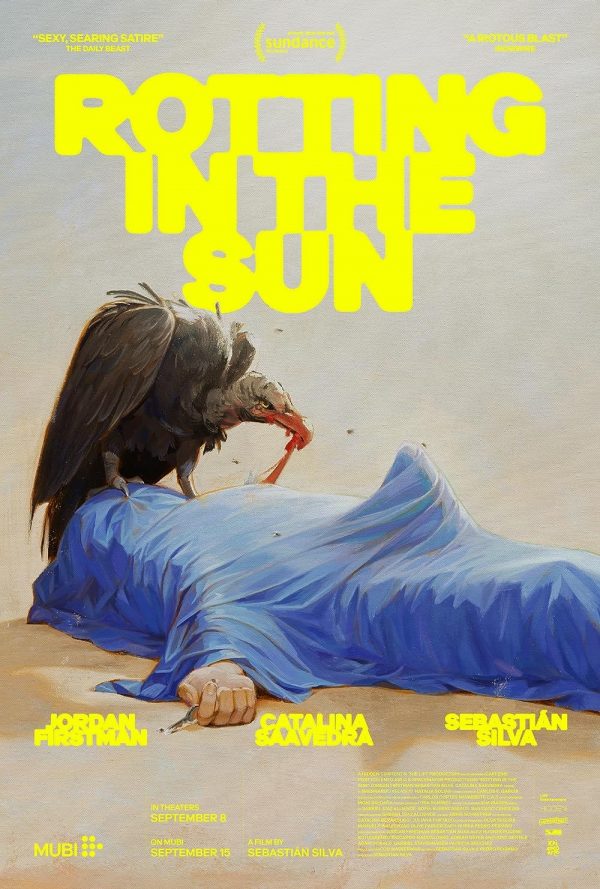
“Rotting in the Sun” (USA/Mexico)
When an overwrought, angst-ridden, drug addicted filmmaker (Sebastián Silva playing a fictional version of himself) unexpectedly meets a wacky, unhinged comedian/social media influencer (Jordan Firstman playing a fictional version of himself) at a gay Mexican beach resort, the troubled director does all he can to distance himself from his new acquaintance when he becomes interminably annoying, especially in his incessant, unfocused pitches for collaborating on a new movie project. But, when the financially strapped filmmaker returns to his home in Mexico City, he reluctantly relents on the comic’s offer when all his other production proposals are turned down by would-be backers. He thus invites his new writing partner to come stay with him while they hammer out the script, but, upon his collaborator’s arrival, he finds the director has mysteriously disappeared. What ensues is a humorous gay comedy-mystery in which clues about the disappearance slowly emerge. At the same time, however, the story also delves into some surprisingly mature and insightful themes, developments very much in contrast to the film’s screwball narrative and its somewhat manic opening act. Writer-director Silva’s latest thus presents viewers with an intriguing combination of plot elements that one might think shouldn’t belong in the same picture but that work surprisingly well together. While it’s true that the ending seems somewhat abrupt and that some segments run on a little too long (particularly in the first half-hour), with a few others that could have been omitted entirely, the majority of the material nevertheless holds together well, making for an entertaining, if somewhat offbeat, time at the movies. Sensitive viewers are strongly cautioned, however, that the film features numerous scenes with explicit depictions of gay male sexuality, so those who are easily given to offense may wish to pass on this unrated release. Those considerations aside, though, this is a film that’s more than it might superficially seem, particularly the further one gets into the story. With three Independent Spirit Award nominations to its credit, this offering is quite an eye-opening ride into a world that many may be unfamiliar with, but it’s also one that simultaneously makes us laugh and makes us think – a rare combination to be found in the same picture, to be sure.
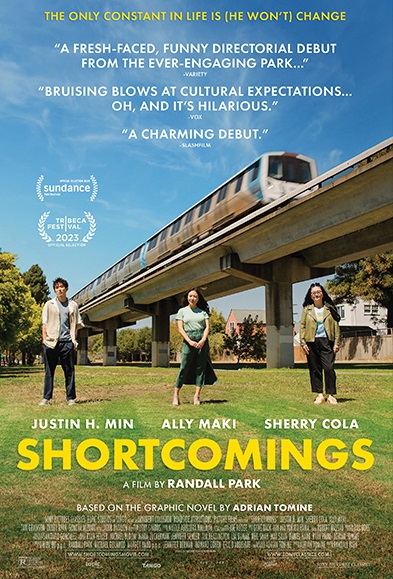
“Shortcomings” (USA)
When life doesn’t quite turn out as planned, it’s easy to become frustrated, cynical and embittered, falling into a trap of unrelenting wallowing and victimhood from which it’s difficult to escape. But what will staying in such a rut accomplish? That’s the harsh reality that an aspiring but unsuccessful Bay Area filmmaker (Justin H, Min) must face when his plans never materialize as hoped for, circumstances that taint his overall outlook and impact other areas of his life, such as his increasingly strained relationship with his live-in girlfriend (Ally Maki). To address these issues, he frequently seeks the advice of his best friend/confidante, a wisecracking, serial-dating lesbian (Sherry Cola) whose own life is more than a little dysfunctional. Their friendship is thus essentially tantamount to an ongoing exercise in misery loves company. But the unfulfilled auteur is suddenly and unexpectedly forced to get off the dime when his significant other announces that she’s moving to New York to accept an internship, leaving him alone in Berkeley. So what is he to do now? That’s what he’s about to find out. However, this unforeseen time by himself proves to be a dual-edged sword, an opportunity for newfound personal freedom but also a time in which he’s forced to get his life back on track, a dicey struggle in many respects – not to mention one filled with ample unanticipated fallout. This smartly written offering is full of eye-opening, unexpected plot twists, but they never feel forced, and they’re often quite revelatory about the protagonist’s true nature. In doing so, the picture successfully and intriguingly combines multiple genres, including romantic comedies tinged with elements typical of character studies, matinee dramas and hard-hitting social commentaries. Debut director Randall Park has also infused this release with an array of biting one-liners and a pervasively edgy quality when it comes to the true nature of relationships, an attribute not unlike that found in films like “(500) Days of Summer” (2009), “Bros” (2022), “Crazy Rich Asians” (2018), and even such Woody Allen projects as “Manhattan” (1979) and “Annie Hall” (1977). What’s more, “Shortcomings” is not afraid to show the unflattering sides of otherwise-likable characters, a theme frequently seen in the movies of filmmakers like Nicole Holofcener. Because of all this, there’s a certain brusqueness to the narrative and the characters that some viewers might find off-putting, but that’s also one of this production’s innate beauties in that it serves up an unbridled authenticity not often seen in pictures like this. Even though this release had a brief theatrical run late last summer, it’s largely gone unnoticed. Thankfully, however, it’s now available for streaming online and makes for a frank but refreshing watch compared to many other comparable offerings, one that gives us all a lot to think about.
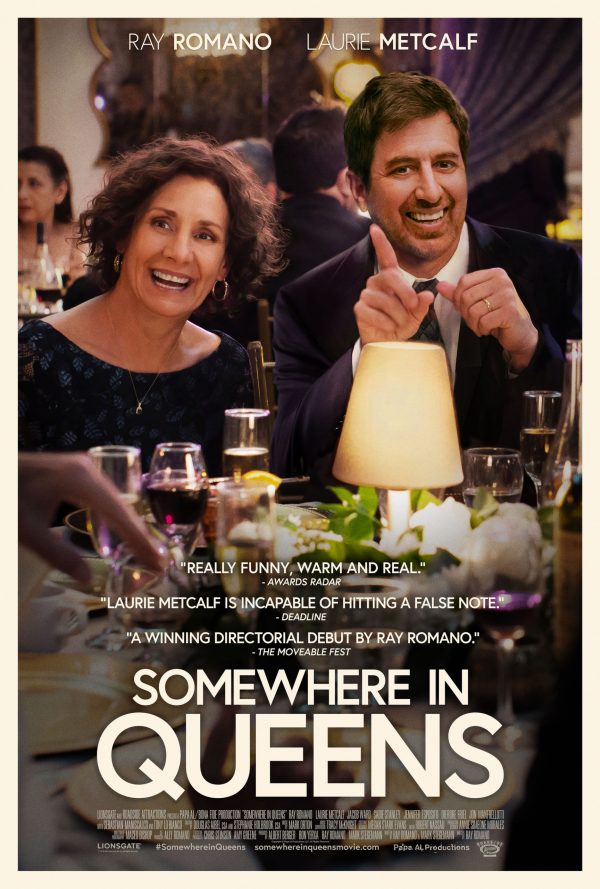
“Somewhere in Queens” (USA)
Genuinely funny family comedies – those without rampant silliness, obnoxiously cynical, smart-mouthed kids, and saccharine-encrusted coatings – have become a rarity in recent years, but, fortunately, this debut feature from actor-writer-director Ray Romano has breathed some new life into this genre. This film about a blue collar New York construction worker (Romano) follows his loving efforts to help out his painfully shy but gifted 18-year-old son (Jacob Ward) earn a college basketball scholarship in an effort to help him stave off a future that’s likely to be disappointingly identical to his own. However, despite his earnest, heartfelt gestures, he ends up creating more issues than he bargained for, some of which threaten to saddle his tight-knit Italian family with more headaches and hurt than expected. The result is a delightful though far from sappy offering very much in the mode of comedies they generally don’t make any more. The film is chock full of hilarious one-liners from a smartly written script that’s executed with snappy direction, steadily paced editing and fine acting, especially in the award-worthy performance of Laurie Metcalf as the athletic prodigy’s mother. The picture also presents one of the best send-ups of New York Italian family life since “Moonstruck” (1987), raucous without becoming riddled with stereotypes. To be sure, a few story threads would have been better cut out or scaled back, but, on balance, “Somewhere in Queens” serves up a charming, entertaining offering with a number of unexpected twists and turns to keep the material fresh and lively. The film may not have received much fanfare with its limited theatrical release early in 2023, but, thankfully, it’s available for streaming online and more satisfying than a big bowl of pasta. Abbondanza!
Noteworthy Delayed Releases (In Alphabetical Order)
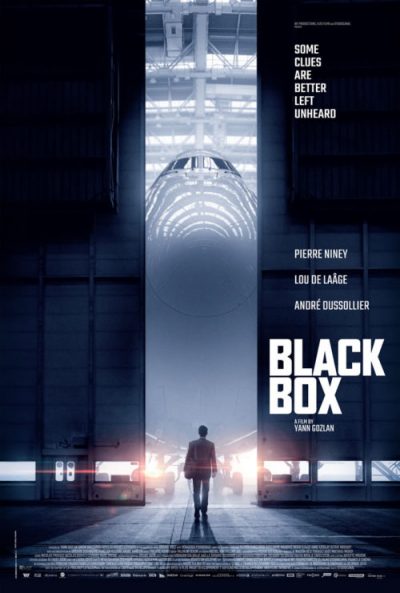
“Black Box” (“Boîte noire”) (France/Belgium)
Talk about a helluva movie! Writer-director Yann Gozlan’s stylish, suspenseful thriller follows the plane crash investigation conducted by a diligent, talented aviation technician (Pierre Niney) whose keen sense of hearing is a valuable asset in reviewing the contents of the downed aircraft’s cockpit voice recorder (CVR or more commonly called “the black box”). But, given his reputation for being scrupulously thorough, he’s not satisfied by what appears to be the obvious explanation, a conclusion that draws criticism from many of his colleagues, who believe that he’s chasing windmills, if not paranoid and possibly delusional. His dogged determination won’t let him stop, however, especially when a number of suspicious smoking guns begin turning up, some that hit close to home and begin placing his credibility, and even his personal safety, in jeopardy. Despite a slight tendency to drag a bit in the second hour, this contemporary noir-esque offering gets virtually everything else right. Its inventive cinematography, excellent film editing, engaging soundtrack and fine performances mesh perfectly, and the slow-simmering pace is ideal as clues are meticulously doled out in carefully measured parcels, much like what one might find in the pictures of Alfred Hitchcock, Brian DePalma and Roman Polanski. In fact, in many ways, the structure of this release is strongly reminiscent of Polanski’s chilling and captivating slowburn thriller, “The Ghost Writer” (2010). I’m truly mystified why this picture hasn’t received wider attention or distribution, having played in extremely limited theatrical release in 2022, but, thankfully, it’s now available for streaming online and home media. If you’re looking to watch something that will hook you and take you on a spellbinding thrill ride, give this one a look; you won’t regret it.
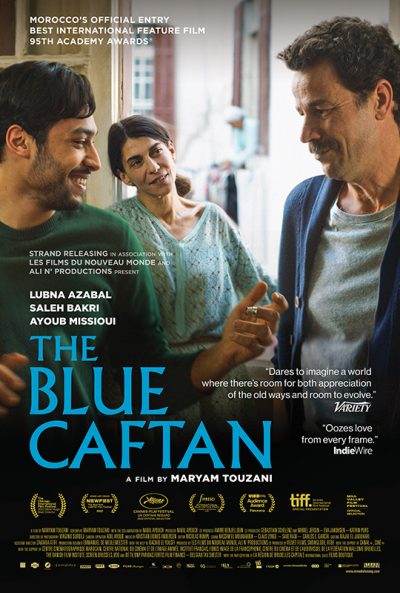
“The Blue Caftan” (“Le bleu du caftan”) (France/Morocco/Belgium/Denmark)
Perhaps the biggest question I have in connection with this film is, “Why hasn’t it received far more recognition than it has?” This positively beautiful picture – winner of the Un Certain Regard FIPRESCI Prize at the 2022 Cannes Film Festival – should have received far wider attention than it has. Writer-director Maryam Touzani’s second feature outing tells the tender, touching story of a middle-aged husband and wife (Saleh Bakri, Lubna Azabal), owners of a traditional Moroccan caftan shop who take on a handsome young apprentice (Ayoub Missioui) to help with their backlog of orders, a decision with ramifications that extend beyond the workplace, including those of an amorous nature. This gorgeously filmed, sensitively presented tale succeeds on so many levels that it’s difficult to list them all – a superbly nuanced screenplay, a beautiful background score, gorgeous costuming and exquisite cinematography, to name just a few. It also brilliantly evokes a variety of moods, from romantic to loving to sensual to erotic, all without ever becoming obvious, excessive or tawdry (though don’t be surprised if it opens up the water works at times, so keep the hankies within reach). Then there are the stellar performances of the three principals, all masterfully handled by Azabal, Bakri and newcomer Missioui. Indeed, how this one got so egregiously overlooked truly escapes me. It should have rightfully claimed nominations for best foreign language/international film in a number of competitions, given its far superior attributes compared to many of the underwhelming releases that somehow managed to land awards or nominations. It’s rare these days when a film has just about everything going for it, but “The Blue Caftan” certainly succeeds at this and is definitely well worth the viewing time.
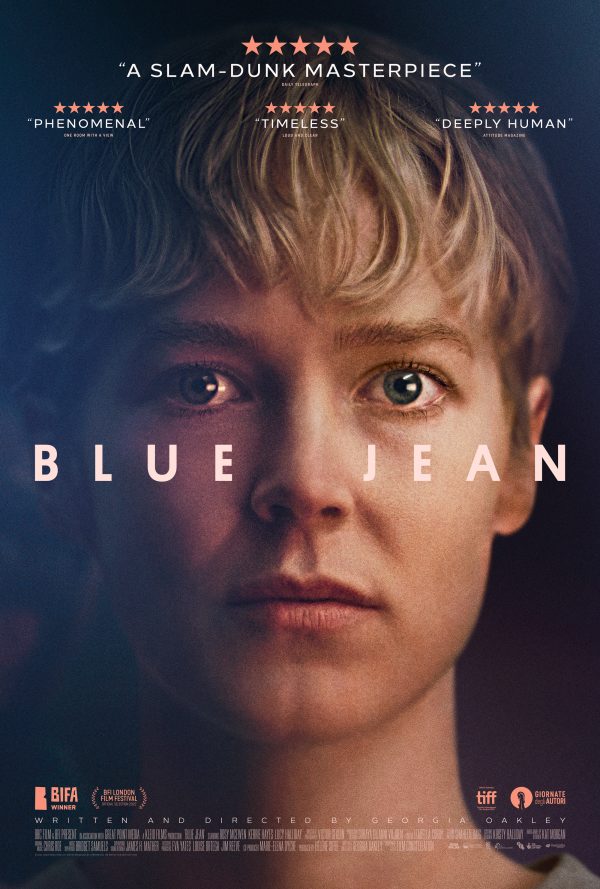
“Blue Jean” (UK)
It wasn’t all that long ago when the LGBTQ+ community not only didn’t have legal protections for its rights, but also faced blatant discrimination against its constituents, prejudiced initiatives aimed at denying them equal treatment under the law and even subjecting them to lawfully sanctioned ostracism. This was true even in “civilized” and “progressive” societies like those found in North America and Europe. And it prompted individuals to live in fear of losing their jobs and leaving them open to ridicule without ramifications for their detractors, not to mention disrespect and mistrust from their own families. Those chilling conditions are ominously brought to light in this period piece drama set in the UK in the late 1980s, when Prime Minister Margaret Thatcher’s Conservative government sought the passage of Section 28, legislation aimed at prohibiting activities openly promoting homosexuality, a bill carrying wide-sweeping implications for the LGBTQ+ community. Many of its constituents, like Jean (Rosy McEwen), a young lesbian physical education teacher, retreated into the closet to keep out of sight. But those efforts derailed whatever social progress had been made, damaging those individuals’ self-esteem and creating a divisive schism between those who vociferously demanded justice and those who chose to keep a low profile to protect themselves, as evidenced by the experiences of the teacher and her out and proud girlfriend (Kerrie Hayes). Writer-director Georgia Oakley’s debut feature does a fine (if somewhat predictable) job of illustrating this rift and the effects it had on both the public and personal lives of these people, an effort that earned the film a 2022 BAFTA Award nomination for Best Debut by a British Writer, Director or Producer. Admittedly, the picture’s opening act meanders a bit, but, once it gets on track, when the emergence of various damning revelations threatens to blow things wide open, it steadily grows more powerful and heartfelt, qualities supported by the fine performances of the cast, solid writing, and its skillfully crafted atmospheric cinematography and production design. It also provides viewers with a potent cautionary tale about the effects of initiatives like Section 28 (which was in force from 1988 to 2003) and the parallels to this legislation that are currently under consideration in various US jurisdictions. It effectively shows us how Jean became so blue – and how we should seek to prevent the same from happening to the rest of us.
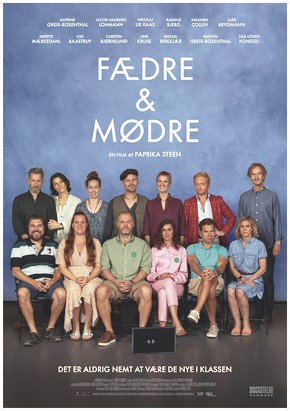
“Fathers and Mothers” (“Fædre og mødre”) (Denmark)
Ah, parents these days. They’re not what they used to be, which is unfortunate, as this scathing Danish comedy-drama aptly illustrates. Director Paprika Steen’s latest serves up a wickedly funny take on a group of upscale parents who have enrolled their children in an elite private school designed to help kids maximize their potential. Despite their seemingly good intentions, however, the parents in this story unwittingly compete with one another to be the best über-moms and dads possible, particularly when it comes to showing off their degrees of social consciousness and political correctness. In the process, they ostensibly engage in polite but toxic games of one-upsmanship with each other, posing that eventually transforms into bitter arguments that violate their so-called principles and bad behavior that makes anything their kids do look tame by comparison. Much of this plays out at a getaway country weekend for the parents and their children, where a form of unconscious role reversal takes place in which the grownups show their true colors on a variety of fronts as their more mature kids look on. Some may view all this as mean-spirited, but it’s actually spot-on when it comes to poignantly portraying the hypocrisy of those who believe that their you-know-what doesn’t stink. Given the multiple characters and story threads at work here, the film can be somewhat episodic at times, and a few of the narrative tracks don’t feel fleshed out as fully as they might have been. Nevertheless, this offering paints an authentic picture with its share of incisive dramatic moments, as well as ample biting humor that’s depicted directly, by implication and even in deftly placed visuals. When viewed in this context, it’s apparent that there’s a lot more going on here than may superficially meet the eye. There’s a great deal of insightful material tightly packed into this package, but it mostly involves things that need to be said – and, ultimately, in ways that are very much in your face. Let’s hope that those who need to get the film’s message indeed do considering what’s at stake.
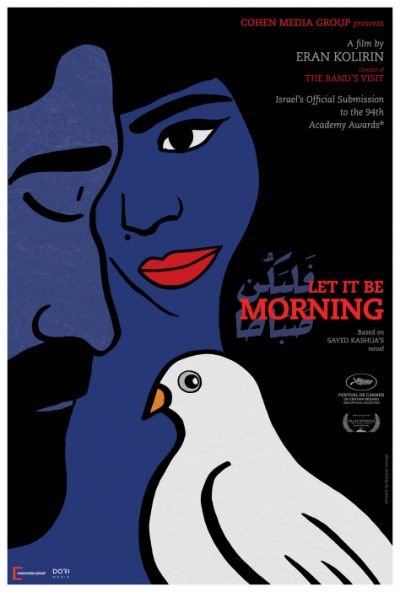
“Let It Be Morning” (“Vayehi Boker”) (Israel/France)
Prisons come in a variety of forms – some imposed on us, others self-created – but, regardless of how they materialize, they all have the same impact: a means for keeping us locked in place. The myriad permutations they embody and the ways in which they affect the members of a family and their community provide the focus for acclaimed writer-director Eran Kolirin’s latest. This gentle comedy-drama follows the lives of a rural community populated almost exclusively by Palestinians located within Israel’s borders that suddenly and inexplicably goes on lockdown for an indefinite period of time, preventing anyone from leaving or entering. As the ordeal wears on, residents begin running out of supplies, and their nerves become progressively frayed, prompting a growing number of standoffs, confrontations, revelations and even reconciliations as the characters all seek to free themselves from their confines, be they physical, emotional, psychological or relationship-oriented. But, as troubling as all this may sound, events unfurl in unexpected ways, often laced with humor, satire and heartfelt emotion. Developments tend to evolve somewhat slowly, but the payoffs are definitely worth it in a story that’s beautifully told and photographed, backed by a gorgeous original score. Admittedly the picture tends to be somewhat episodic at times, but it manages to cover all its bases and leaves no narrative threads unresolved. This Un Certain Regard Award nominee from the 2021 Cannes Film Festival seems to have taken a rather long time to make it to general release, but the wait was definitely worthwhile, a touching, sincerely realized work and a genuinely heartrending cinematic gem, one of the finest films to come out of Israel in quite a while.
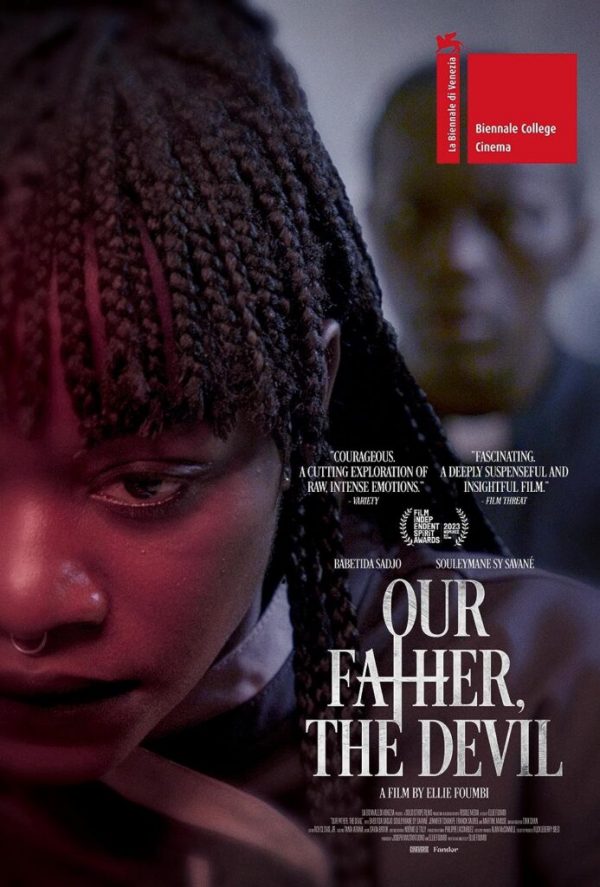
“Our Father, the Devil” (“Mon père, le diable”) (USA/France)
They say it’s never too late to do the right thing. But how far does that extend? Does it include, for example, atoning for the heinous crimes of a ruthless warlord responsible for the brutal murders of entire villages? Or must such a monster be forced to pay heavily for his crimes, no matter how long it’s been or how contrite the perpetrator may have become? And, in the midst of a debate like this, what would Jesus say? Those are the heady questions raised in this gripping drama about an African woman (Babetida Sadjo) who escapes the vicious atrocities of a cold-blooded strongman after he kills her family and starts her life over as a chef at a nursing home in France. But, when a new priest (Souleymane Sy Savane) unexpectedly shows up at the senior facility, she’s thrown back into the terror of her past when she recognizes the cleric as the man who took her life away from her. What is she to do? How is she to cope? And how will she handle the situation? That’s the story that plays out in writer-director Ellie Foumbi’s brilliant debut feature, a gripping tale that will keep audiences on the edge of their seats. The picture’s mutilayered narrative keeps viewers (and characters) guessing, almost as if both are being toyed with by the filmmaker, but this is carried out so skillfully that one can’t help but remain riveted. The story is effectively fleshed out by the film’s superb ensemble cast (especially the two leads), backed by inventive cinematography, exceedingly clever film editing, a fine background score, an array of subtle touches and a surprising amount of strategically placed, well-executed comic relief. Admittedly there are some modest pacing issues in the middle, but they’re usually employed to set up one of the picture’s many smartly developed plot twists. This 2023 Independent Spirit Award nominee for best feature, as well as the recipient of many film festival award wins and nominations, is a well-kept cinematic secret that genuinely deserves wider attention, both as a thoughtful meditation and as an engaging drama.
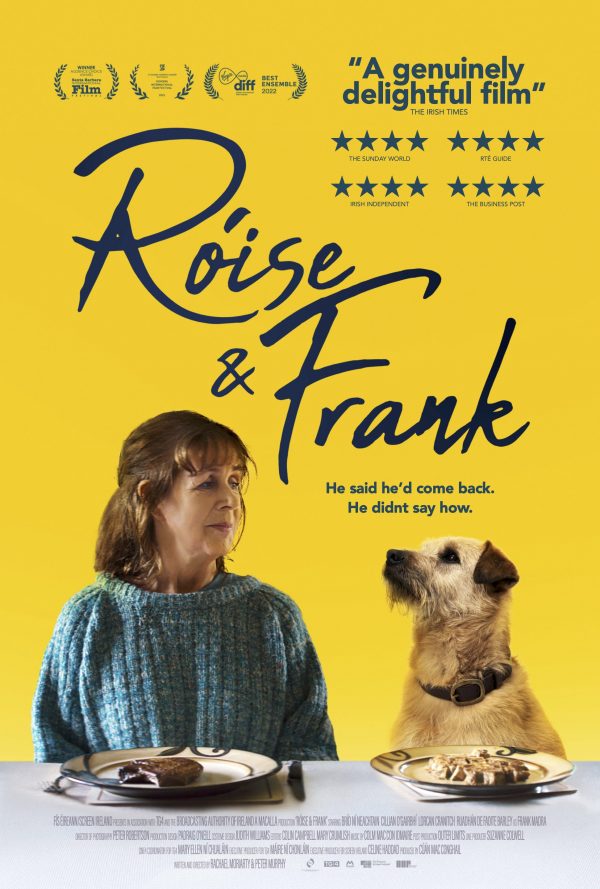
“Róise & Frank” (Ireland)
How refreshing it is to watch a sweet, touching family film without it oozing enough sugary syrup to make even the most hardened stomach nauseous. Such is the case with the latest offering from writer-directors Rachael Moriarity and Peter Murphy, a warm, loving, heartfelt tale about a profoundly saddened and withdrawn Irish widow, Róise (Bríd Ní Neachtain), who springs back to life with the arrival of a mysterious stray dog whom she suspects is the reincarnation of her late husband. While those in her life are supremely skeptical, she can’t deny the plethora of synchronicities that occur that reveal the tail-wagging rascal’s true nature. By coming back, “Frank” (Barley the dog) helps his wife emerge from her prolonged grief and assists others, such as a geeky young neighbor boy (Ruadhán de Faoite) in becoming a proficient hurling player, a sport that the dog’s human predecessor fanatically loved. But there’s even more to Frank’s return, as seen in a heart-tugging series of unexpected twists and turns that will positively leave viewers teary-eyed with joy. Despite a few predictable story elements, “Róise & Frank” nevertheless manages to delight in a natural, emotionally grounded way that never seems forced or artificial, thanks to its fine performances, breezy writing, beautiful cinematography of the Irish landscape and affecting original score. This enchanting Gaelic language offering will charm audiences to no end without ever resorting to schmaltz or manipulation, earning every reaction it evokes. Like its four-legged protagonist, this one could indeed leave viewers coming back for more.

“Splendid Isolation” (Netherlands)
What kind of movie would we have if Ingmar Bergman directed a sci-fi/fantasy film? That’s an intriguing prospect, one that’s precisely what’s on offer in this fascinating release from writer-director Urszula Antoniak. This surrealistic tale of two women (Anneke Sluiters, Abke Haring) on an otherwise-uninhabited island in the wake of some unspecified mass catastrophe follows them through their largely unstructured daily lives. Their story primarily focuses on their unusual relationship, which takes the form of a less-than-veiled metaphor for the nature of the COVID-19 pandemic, characterized here by a quietly “polite,” but nevertheless unmistakable, power struggle between an aggressive authority figure (Haring) and a reluctantly submissive everywoman (Sluiters). But there’s more to it than that, as becomes gradually apparent as the film plays out. What’s most impressive here, though, is that the minimalist narrative unfolds with remarkable symbolic subtlety, represented by the picture’s many deftly nuanced elements that are neither overly enigmatic nor unduly obvious, all eloquently enhanced by the film’s gorgeous cinematography and beautiful background score. It calls to mind the stories told in pictures like “The Pink Cloud” (2021) and “Embers” (2015), even though the nature of the seminal event in this story is never delineated (though, from the way things unfold, it’s not especially necessary either). Admittedly, some aspects of the story seem clumsily improvised, and others start out needlessly cryptic, but, once the symbolism of these sequences becomes apparent, they prove stunningly incisive, especially when interpreted on a collective basis. The result is an insightful, thought-provoking, economically told release that proves a film can successfully and expressively present meaningful material by showing more than telling, a model that more filmmakers would be wise to follow.
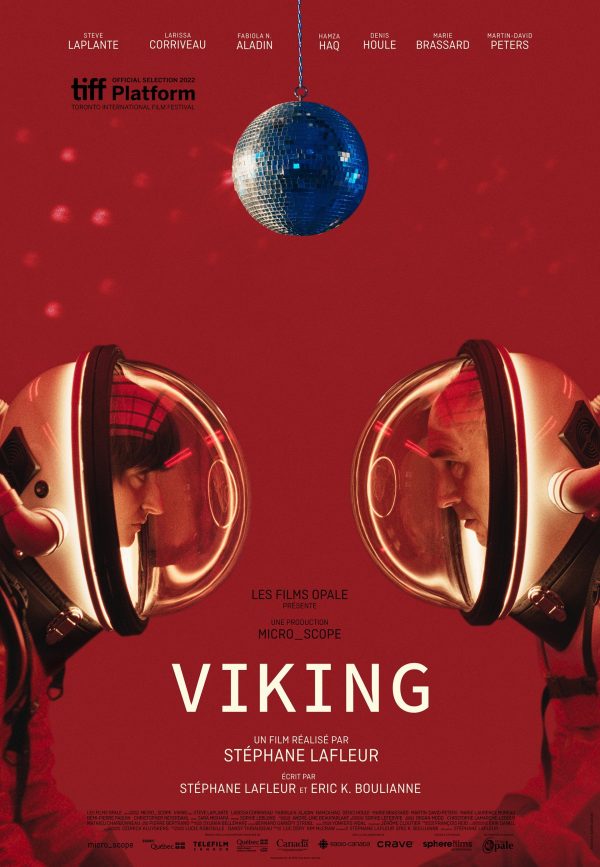
“Viking” (Canada)
What would you do if you encountered problems while serving as a member of the first mission to Mars? You could probably contact experts for advice on technical issues easily enough, but what about personal or interpersonal issues? That might not be as easy, especially if a psychiatrist wasn’t part of the crew. So what is one to do? In this inventively fictional what-if offering, space agency officials assemble and isolate an earth-based team of counterparts whose personalities, interests and character are virtually identical to those of their Red Planet doppelgangers. The purpose? To see how these terrestrial surrogates respond to the kinds of challenges that could potentially affect their Martian peers as a means for developing civil solutions and helpful coping mechanisms when these situations arise. Good intentions aside, however, things don’t quite work out as anticipated, both for the astronauts and their earthbound doubles. And that premise provides the basis for this brilliant French Canadian sci-fi comedy-drama whose wry humor (some of it quite dark) is simultaneously hilarious, insightful and metaphorical, not to mention astoundingly original, with some of the best writing I’ve seen in ages. The film’s intriguing foundation and telling narrative speak volumes to us on multiple levels (some of which have nothing at all to do with space travel; one could think of this as a fusion of the TV series Moon Base 8 and a Stanley Milgram behavioral experiment). All of this is backed up by the picture’s fine performances, superb score and outstanding art direction/production design, along with more than a few cinematic homages to such otherworldly classics as “2001: A Space Odyssey” (1968). It’s no wonder that this release captured an impressive 10 Canadian Screen Award nominations, including a win for its stunningly gorgeous cinematography. It’s so heartening to see a film these days that’s highly intelligent, raucously funny, supremely thoughtful and eminently entertaining all at the same time. Writer-director Stéphane Lafleur’s fifth feature outing may not have received much fanfare, but this truly is a picture well worth seeing (thankfully it’s available for streaming on multiple platforms). This one is sure to put you into orbit.
Copyright © 2023-2024, by Brent Marchant. All rights reserved.



